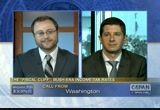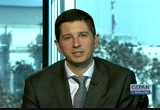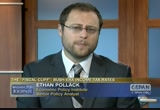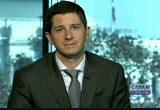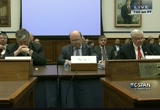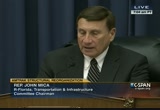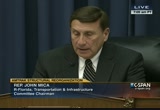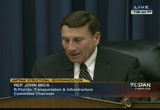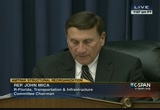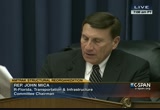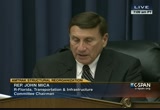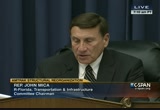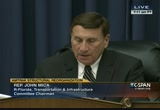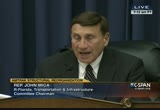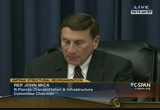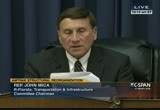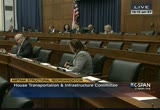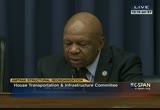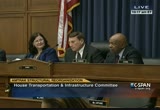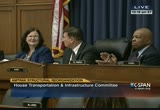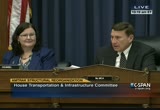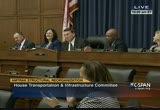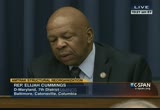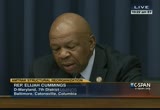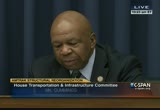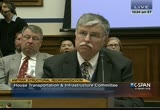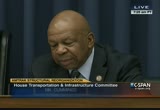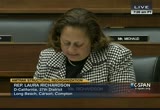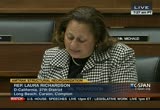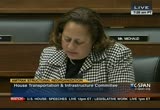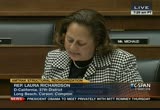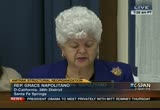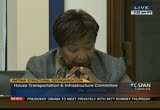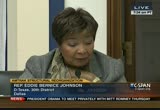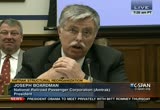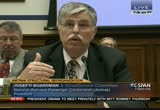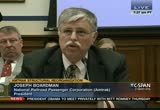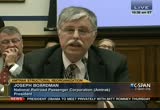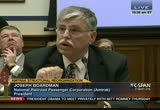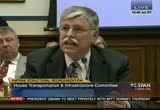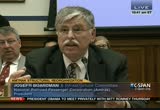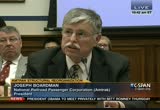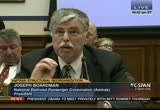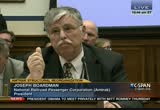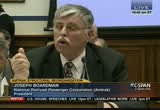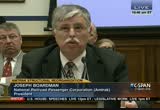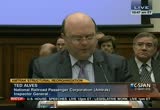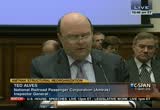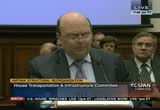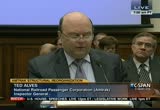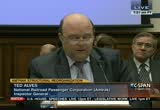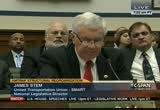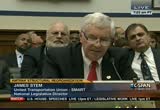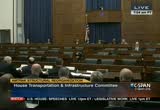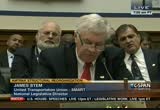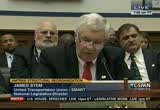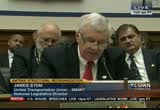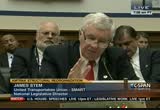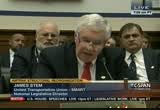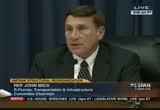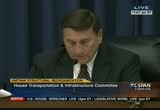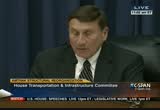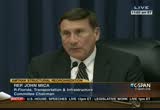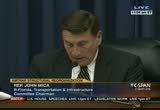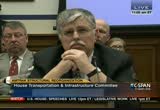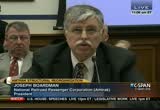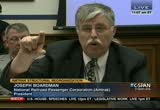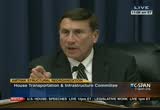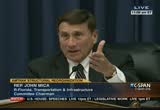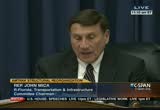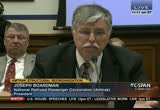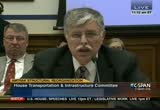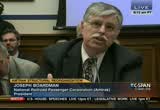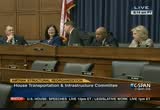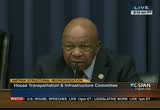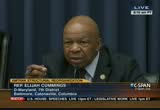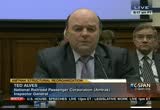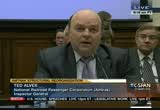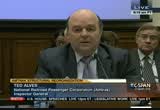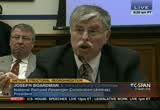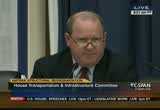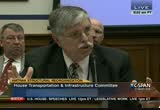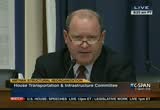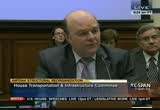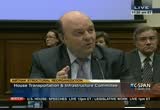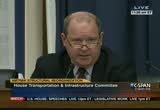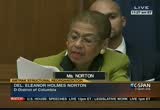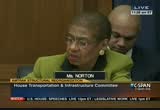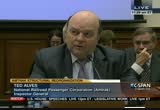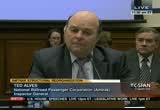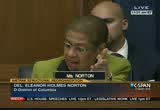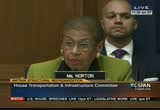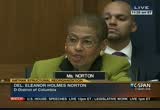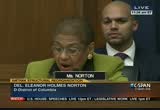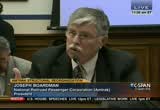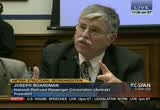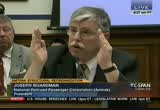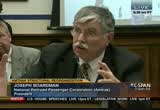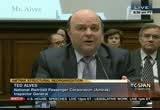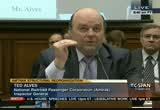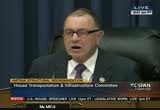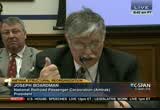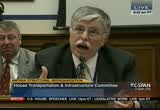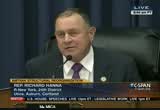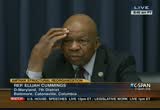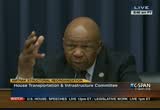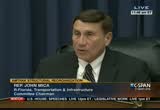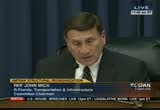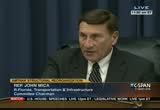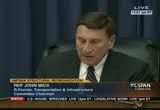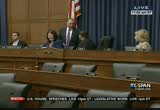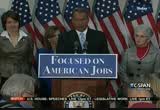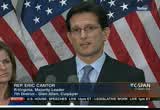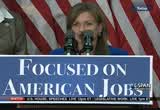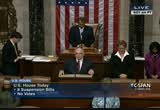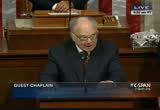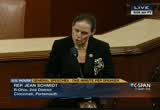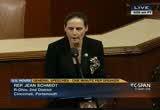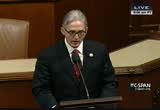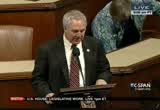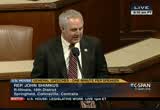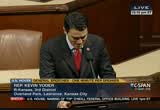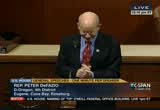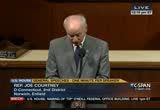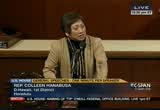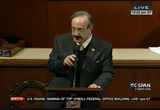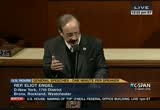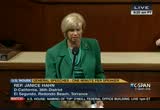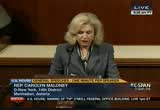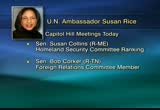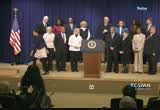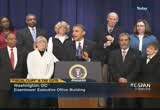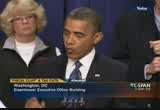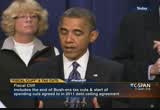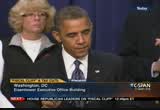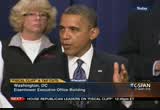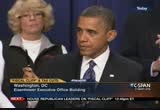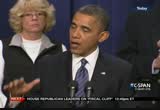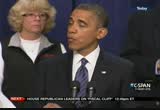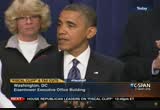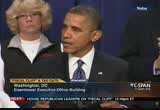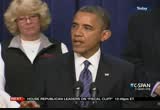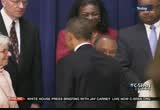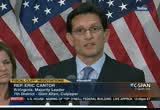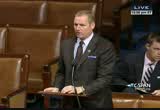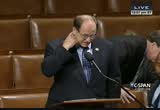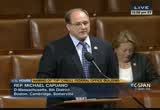tv Public Affairs CSPAN November 28, 2012 10:00am-1:00pm EST
10:00 am
bring about positive change to define politics, to say the least. and we bemoan how a divided the politics are currently after the election. economists usually determine policy prior to tax rates. host: we are host: we are running out of time to give final thoughts as we conclude. what do you think is next on this debate? guest: we are weeks away from a deadline. an important one. where not only our tax policy is going to change but significant spending cuts are slated to take effect as well. i'm actually a little bit more
10:01 am
concerned today than i was a day or two ago. in the sense at the moment policymakers are moving in opposite directions. in part that's the ways of washington and i think we'll see a few collapses before we ultimately get together somewhere in the days before christmas on a compromise. we have been talking about marginal tax rates, which i think are a key part not only of the budget question, but a key part of the broader economic question in terms of economic growth. and i'm hopeful that any solution that comes together is going to think a lot about economic growth and not just budgets. host: ethan? guest: i think i may be a little more hopeful than alex is. i think that there's a general agreement that the sequester will happen. republicans and democrats and the president are all opposed to it happening. there's also a consensus right and left it would be bad for the economy.
10:02 am
so i think that when we are just looking at the tax component, there are certain things that we kev knitly -- definitely need to do. patching the a.m.t. for the first year is big. if we don't get a deal on the rest of the tax cuts until early 2013, i don't think that would be the worst thing for the economy. i do believe that it is kind of a little more of a slope. i do think that there is -- i think that the worst part of the fiscal cliff are going to be avoided, and beyond that i think that both sides if they don't come together then we have a lot more revenue, and then we could do something like tax reform on top of that higher revenue, which would still bring in some revenue, yet at the same time satisfy a lot of republican demands for possibly lower rates. again, we can cross that bridge when we get to it. right now i think we won't -- if there is going to be a deal in this lame duck session, we are not going to know until the very end. host: thank you, gentlemen.
10:03 am
appreciate your helping us out with this conversation about this so-called fiscal cliff. and the conversation continues in washington and outside as both parties take their arguments to the public. cnn reporting that the white house wants americans to make their point on twitter. we will be following all of this with our cameras, as well as on our website, c-span.org/fiscalcliff if you want to follow along. that does it today for -- it for today's "washington journal." to the infrastructure committee. [captioning performed by national captioning institute] [captions copyright national cable satellite corp. 2012] >> we are pleased to conduct this full committee oversight hearing on amtrak and today -- the title of today's hearing is getting back on track, a review of amtrak's structural reorganization. so welcome and we'll have -- we have one panel of witnesses today. and the order of business will
10:04 am
be that i will start with an opening statement, provide some background, and will yield to mr. cummings this morning, and other members who wish to be heard, then we'll turn to our witnesses. we'll hear from all of them and then go to questions. pleased to welcome, again, everyone this morning. now, this is one of a number, we have actually held fourth in a series of full committee oversight hearings on amtrak and u.s. passenger rail policy in the united states. we actually have two more scheduled. one will be on thursday, december 3, and that will focus on high speed and inner city passenger rail grant program. and then we'll have the final hearing on this important subject. thursday, the 13th of december, and that will be on the northeast corridor. ironically yesterday i was back
10:05 am
in new york city actually looking at some of the flood and storm damage. many of the transportation infrastructure facilities were adversely impacted, huge amount of damage. they have incredible new york city is resilient, and how well they are coming back. i think they got about 95% of their transit operations, rail was particularly hit. almost all of east side lower manhattan tunnels flooded, and just think of the massive effort put forward to get those trains running. they probably move about 20% of all passengers in the world in new york city. and a hit like that was incredible. i understand mayor bloomberg, we met with yesterday, will be in town today, and we had
10:06 am
discussions yesterday about fema, which our committee overseas -- oversees and also transportation and infrastructure that was hurt. that may be the subject of additional scrutiny by the committee, but today, again, we are focused on looking particularly at amtrak's structural organization. i might also recall that with the last hearing what we'll be doing on the northeast corridor, our very first hearing was on january 27, 2011, when i became chair of the full committee. we did that in grand central terminal where we focused on the future of high speed rail in the northeast corridor, and our last hearing on december 13 we'll focus on that same and the progress we have made since that hearing. it's kind of interesting how you
10:07 am
come about choosing topics for some of these hearings. after reflect a moment, a lot of people when they go home, maybe they go to bed, maybe they count sheep or read a novel. i like to tuck copies of different trade publications at my bedside and was reading in awe. it had to be after august, because this is august, 2012, progressive railroading had a great article which featured -- the title is "at long last, a longer view." it focuses primarily on passenger rail service and amtrak. i thought it was quite interesting, particularly quite interesting because it outlined some of the work that amtrak had been doing regarding its reorganization, its structural
10:08 am
management, and the -- responding to some of the previous studies that called for more accountability, more responsibility, and the way amtrak is structured. that led me to say we really need -- the committee really needed to look at where we are in this whole process and where we have been. for just a minute to tell you where we have been, we have had a g.a.o. study in 2005 that asked for amtrak to develop a strategic plan that could clearly link the organization's management to overall corporate goals. amtrak is a corporation. i was intrigued by a comment that joe boardman, the president and c.e.o., made in this article
10:09 am
when he pledged in the article, and i take his quote from the article, to run this company more as a business and less as a government entity. quite inspiring goal and something we have been trying to achieve from this committee. he set some of the bar and, again, back to 2005, reviews of amtrak have called for improvement, again, in its organization and management strategy. in 2010, the i.g. of amtrak released another report and as a result of that 2010 report, in november of 2011 amtrak released their five year strategic plan with corporate goals and organization structure, targets that they intend to use to create more transparency and
10:10 am
accountability. and that's what we'll focus a great deal on today is where they are in that process, how they have come along. we'll hear from the head of amtrak, mr. boardman, we'll hear from the inspector general, and we'll also hear from a representative of workers and labor and see how they assess that progress. the plan, the strategic plan that's now under way hopefully we'll hear to be fully implemented by next year, we'll get exact update, again, from mr. boardman and others. the plan that was devised takes amtrak and organizes it into six business lines, a vice president or manager of business, and we'll see how that has come to pass and how that organization
10:11 am
is -- reorganization is proceeding. and the purpose of that is to establish performance goals that are outlined in the strategic plan so that profits and losses can be addressed, and also accounted for. past amtrak managers have not, unfortunately, been held accountable for what's happened in their departments, and that's not my evaluation, it's the evaluation of several of these studies. also in the past, there have been amtrak attempted reorganizations without clear goals, unfortunately. i hope to better understand amtrak's strategic plans, its corporate goals, and specific progress on its reorganization. and also learn how it will improve performance, accountability, and cost savings. i approach this hearing with a very open mind. amtrak's strategic plan is very
10:12 am
important. i know it requires a transformative approach from what they have done in the past. it's not just a rearranging the chairs on the deck of the titanic. we want to make certain that there is a positive progress. from a fiscal standpoint and everybody's focused on the fiscal cliff and sometimes people give me a hard time for focusing on amtrak, but we have this past year put $1.4 billion into amtrak and government subsidies. almost half a billion in operating subsidies and close to $1 billion in some of the capital improvements. over the years that's -- that commitment's remained pretty much the same. we do have a responsibility with taxpayer dollars to make certain that this operation, which is
10:13 am
highly subsidized, and we did do a hearing on that one of the past three, four hearings we did, maybe they can put that on the board, is the comparison of federal subsidies, the average cost of my ticket coming back from new york, government subsidized the the average cost of $46.33. fortunately, and i read through the report pretty carefully, amtrak has made some progress in acela, so the loss isn't that great for acela, but this is the average ticket subsidy simply by taking the 29 million passengers or 28 if it was last year and dividing it by the underwriting subsidy. other modes of city buses, 10 cents, mass transit, 95 cents, aviation, $4.28. and that was highlighted in a hearing that we -- previous
10:14 am
hearing that we did. we are trying to bring that subsidization for the system down. let me say in closing, i went through the inspector general's report last night and i do want to hear at least the report that he's giving, i'm not sure how much of this he'll address, but seven of the nine board members, we had some reorganization of the board of directors, we now have seven of the nine board members onboard. i also want to know about key personnel. we talked about hiring vice presidents and managers over some of these sectors, and that, as mentioned in the inspector general's report. and finally, that the comment that the inspector general made that the company is clearly in the early stages of implementing many of these restructuring
10:15 am
initiatives, and he further said that recent work shows the sustaining effect -- effectively implementing these initiatives has the potential to significantly reduce amtrak's reliance on federal support. and that's the goal of this. it's not just to beat up amtrak, although some -- sometimes we do become very harsh critics when money is lost or we see lack of progress in some areas. but our goal is to reduce the federal reliance -- reliance on federal support and that's one of the objectives of this hearing, in addition to finding the specifics on the progress of their structural organization and reorganization. i'll introduce our witnesses shortly, but let me yield to mr. cummings who is serving as ranking member at this point.
10:16 am
>> thank you very much, mr. chairman. it is certainly my pleasure to be here. i want to thank you for calling this hearing. mr. chairman, quite often our federal employees had unseen, unnoticed, unappreciated, and unapplauded. in my capacity as the ranking member of the oversight and government reform committee, i hear so much criticism of our federal employees and government employees in general, and i want to take a moment here before i even start to thank joyce rose for her 25 years of public service on behalf of this committee and on behalf of this side of the aisle. i know all of us feel this way.
10:17 am
this is joy's more than likely -- it is her last hearing, and she has always worked fairly with all of our members and with our staff on this side, she has done everything in her power to make sure that not only the congress is served well, but that the country is served well. and so i -- we hate to lose her, but we know as someone said to me, joyce, and i listened to this in a sermon by p.d. jakes not too long ago. he said his son came to him, his son is a singer and he was about to go off to college, and his son said, daddy, i'm not sure this is a thing for me. singers may not make a lot of money. it may not be the right thing for me. and his father went up to him
10:18 am
and he said, son, if it's not the thing, it's the thing that will lead you to the thing. and so this has been -- this transportation committee has been a part of your journey. and we hope that it has been one that has been most meaningful. and we really thank god for allowing your destiny to lead you to us and for our destiny to lead us to you. so we wish you well in your new endeavors as the president, that's quite -- went from staff person to president of operation life save -- life safer, which has the important mission of educating the public on grade crossing safety. may god bless you and thank you so much for your service. of course.
10:19 am
>> if gentleman will yield for just a second. again there's probably no higher tribute than to have the other side of the aisle lead with the praise of your service to the committee, to the congress, and to the country. mr. cummings and i know that you cannot be successful in our position without great staff. and certainly you have worked long and hard, 12 years for the committee, 25 years in congress. a quarter of a century of commitment to public service. i don't think there's anyone that deals with the rail or transit issues in the nation that doesn't know of joyce rose and her commitment to helping everyone. we hadn't passed a passenger rail re-authorization in 11 years. i was the ranking member and
10:20 am
joyce worked with myself, mr. oberstar, and we had great cooperation from both sides of the aisle. we passed the legislation called pria, passenger rail investment. authorization for passenger rail, which is right now the guideline we go by and the authorization. if it wasn't for her dedication, commitment, and incredible knowledge. i just think of the knowledge that will be lost when she leaves her position, we couldn't have achieved that. so, joyce, on behalf of the majority side, which we have had the privilege to have you working with us, and again from mr. cummings and the minority side, we are just eternally grateful. and we are paying a little special tribute to you today. and thank you again for your service. god bless you.
10:21 am
>> i thank you for scheduling today's hearing. following the release in 2005 by the g.a.o. of a report entitled "amtrak management systemic problems require actions to improve efficiency effectiveness, accountability" that was the name of the report, i was asked by then ranking member oberstar to serve as the lead democrat on the special working group convened by this committee to evaluate that report's findings and make recommendations on subsequent action. certainly amtrak was facing challenges at that time, but among other observations, the democratic members of the working group noted in our view that amtrak, quote, faces difficulties in implementing long range strategic plans because of great uncertainty regarding its federal funding each year, end of quote.
10:22 am
during that era, amtrak faced repeated proposals to cut or eliminate the federal funding provided to it. obviously that made it difficult for amtrak's leadership to focus solely on operating the company or on developing long-term goals and performance benchmarks. we hear a lot in the congress about uncertainty. so subsequently, under chairman oberstar's leadership, congress enacted the passenger rail investment improvement act and recommitted to the value of the service amtrak provides. this commitment was expanded by president obama in the comments to the american recovery and reinvestment act, which provided funding to begin many of the capital projects that had been tabled due to years of inadequate federal funding. it is clear that the investments we have made in amtrak are
10:23 am
supported by the traveling public. fiscal year 2012, amtrak achieved the highest ridership levels in its history. that's major news. major. more than 31 million passengers took amtrak in this fiscal year and the service appears poised to continue to grow. against this record of success, my colleagues on the other side of the aisle believe amtrak needs to get back on track as the title of this hearing suggests. it is only because they have, once again, been doing all they could do to try to derail the service. in fact, the republican presidential platform called explicitly for amtrak's elimination. fortunately that misguided platform was resoundingly rejected by the american people who have instead supported the president's call to move forward by implementing policies that
10:24 am
will expand investments in our nation and support our continued economic recovery. this company must stay on track and focus on its core mission of serving our nation's mobility needs as safely, securely, and efficiently as possible. i'm very encouraged by the actions mr. boardman has taken to develop a strategic plan and to introduce an organizational structure that supports the implementation of that plan and increases accountability at all levels of the organization. i might note that when the chairman was talking about subsidies, mr. boardman, i don't think it included amtrak's commuter rail passengers. the actual subsidy is about $5 per passenger, and i would ask in your opening statement you
10:25 am
address that so we will be clear on what that subsidy is. i don't want any confusion about that, because i don't want people watching this think it is something it is not. that said, while we must conduct a thorough oversight over amtrak as over all entities receiving federal funding, our committee has now held seven hearings at the full and subcommittee levels in the 112th congress on amtrak, and today we are convening to examine a strategic plan that has not even been economy implemented. appropriate oversight does not require micromanagement of all facets of an entity's operations, thus while i look forward to the testimony of today's witnesses, i hope we will use this hearing to identify ways we can support the continued success of amtrak, enable it to grow, to meet the increased passenger demands. we should also seek ways to
10:26 am
support continued implementation of the reforms mr. boardman has proposed, and give him and his leadership team the space they need to fully implement their plans rather than requiring them to return to the hill every few weeks. so with that, mr. chairman, i yield back and i want to thank you for yielding. >> i thank the gentleman. are there others who -- anyone on this side? >> first of all i'd like to thank chairman mica and ranking members brown and cummings for holding this hearing today which focuses on it's noted that amtrak has a record of 30.2 million passengers. traveling on amtrak and full year 2011.
10:27 am
10:28 am
>> a 25% cut in funding and even more alarming not having a vision for high-speed rail network. these actions are detrimental to the transportation opportunities for all americans. the alternative to build more roads by more cars and consume more oil should not be our only solution. in fact, according to d.o.t., in comparison, in 1958 through 2012, the united states has invested $1.4 trillion in our nation's highways, $538 billion in aviation, $266 billion in transit, and yet amtrak, which was created in 1971, has received a small fraction of that funding at $41 billion.
10:29 am
when you consider that and compare it to the oil and gas industry, which received $441 billion in federal subsidies, although more than half of those have been available to the energy sector. we have spent to bring that together, we spent more in one year with the oil and gas and energy companies and their industry than we have spent in the entire life of the program of amtrak. clearly there seems to be an imbalance and it's not one that should be continued. regarding the vision of high speed rail, the amtrak excela service is one of those alternatives and know it may only achieve the speeds of average of 83 miles per hour, along the n.e.c., surely that is significantly better than the long delays in crawling engagor interstate systems that we have. this committee should continue the role as it always has to facilitate the development of critical infrastructure and the continuation of one of america's greatest assets, and that's
10:30 am
passenger rail. i want to thank all the witnesses before the committee today. and i look forward to hearing your testimony about how the reorganization of amtrak can make it an even greater service to the american public. with that i yield back. >> i thank the gentlelady. recognize mrs. napolitano. >> thank you, mr. chairman. may i associate myself with the remarks from ms. richardson, but i especially want to thank congresswoman, ranking member brown and elijah cummings for bringing this issue along with you. amtrak is extremely important to california. we have three of the top five busiest corridors are in our california area. two of them are supported totally by the state, but the sure liner is not -- i see there are some cuts coming through and aim going to be looking at very closely because it has $2.8 million ridership. all three are state support services program, and as has
10:31 am
been stated, the vitality must be supported. for the straight sported services program. it's important to all states, especially california, we are a donor state. because it gives more options to commuters and many inner city travelers while reducing highway congestion pollution. california has been at the forefront of reduction of pollution in cars and several other areas. the california transportation commission is voicing their opinion on -- i talked to transportation secretary brian kelly, deputy secretary brian annis, and rail division manager on how they view amtrak's work
10:32 am
with california and cal trans. they are concerned with changes to state support services program, section 209 of the passenger rail investment and improvement act. the priia. that forces the state of california to pay $20 million that are going to be taken out of that budget for them. it runs along the border of my area which is the alameda corridor east which is a train transportation that brings in 40% to 50% of the nation's goods to the rest of the nation. we are watching the reorganization of amtrak, making sure it doesn't hinder any state partnerships. these are critical because they are the ones who will in the end work with the local communities to ensure that we get more people to utilize it. we are pleased that the reorg has created an executive level position of general manager. i look forward to meeting that individual and working with him. it's a very positive step and the states provide 50% of the
10:33 am
revenues to amtrak. we must have a senior amtrak level position to work with state on their programs. and this is especially important, section 209 of prea -- priia negatively impacts states, especially in california. i also want to add my two cents to ranking member elijah cummings' statement on the employees who run amtrak. they have done a beautiful job. i hope they will continue and we will continue to work with them to ensure that not only do they provide good service, but that they also are recognized for the work they do for our ridership. with that i yield back the balance of my time and i thank the chair. >> i thank the gentlelady. miss johnson. -- ms. johnson. >> thank you very much. mr. chairman and ranking member. my remarks are very brief. in october, 2005, g.a.o. issued
10:34 am
a report to then chairman young for lack of a strang plan and the report identified that without a comprehensive corporate mission, amtrak's business practices were lacking and could not ensure consistent and improved corporate performance. in august, 2010, the amtrak inspector general's office released an evaluation report of amtrak's strategic planning and set forth key elements necessary for an effective strategic planning process. the the report formed the basis for amtrak's november, 2011, strategic plan for fiscal year 2011 through 2015. while the re-authorization is not yet fully complete, there appears to be significant in performance and accountability improvements, and i look forward
10:35 am
to the testimony. it seems to me that they are doing exactly as we have desired. thank you. i yield back. >> i thank the gentlelady. others seek recognition? if not, what we'll do is turn now to our three witnesses and welcome them again. our first witness, and i'll recognize him at this time, is the president and c.e.o. of amtrak, mr. joe boardman. thank you. welcome and you are recognized. >> thank you, mr. chairman, mr. cummings, members. i appreciate being here today. and joyce, i'll be on your board so the questions will come from me for the future for o.l.i., but i'm glad that you are there-durable' bring the energy to a very important problem of safety for railroads. i appreciate the work you have done here. angela cody, sitting over in the corner, mr. chairman, who is the one who wrote that article, and
10:36 am
i have already blamed her for this hearing this morning, she's already asked me for another interview, and i understand now no good deed goes unpunished in this process. what aid like to really start with and talk about this morning is that i have been an amtrak customer as a state commissioner of transportation and even before that and i was thinking about this in my own company, a used am -- i used amtrak as the backbone of what we provided in transportation to the social service agencies where we had contracts, because part of the high cost for social service agencies was to transport especially a long distance, for example in new york from the central part of the state to buffalo, to the cancer center, instead of using a -- an ambulance or a very high cost, we would transfer people to
10:37 am
amtrak at youthica or roam or syracuse in some way to get to the buffalo center. so amtrak was right to begin with the answer to part of the reduction in cost savings that the federal government is interested in and the state governments are interested in across the country. and also contributes then to amtrak's revenue as a result of that. so as a customer, i'm focused on customers, and what is it that a customer really needs to ride amtrak or any other service for the future? and so when you look at a transformation of a major corporation, which amtrak is, you really had to spend a lot more time in the diagnosis than they did in the execution. so what you saw for the first year or two was looking at amtrak as an organization first, how do they do their jobs and
10:38 am
should they be done differently for the future? and what you found was in a lot of the past reorganizations, a lot of box moving in the organizations, but not a lot of understanding of what the women and men at amtrak really accomplished to deliver the services that we were really looking for. so some things were good and some weren't. but now we have some results of what we are doing and we made some of these changes on an incremental basis as we have gone along. for example, we knew that a foundation of this had to be why the heck didn't amtrak have any labor contract agreements for over eight years? and why would -- why did we have that kind of a culture at amtrak? my perspective was that you needed to bring that group of people together in a very different way for the future so the reorganization began almost immediately in terms of understanding the strength of this agency was in its men and
10:39 am
women. the work that they did and how they work with us. or with management or not with management. and you need add way to get in there. and the common thread of what a customer wants and what an employer wants and what an employee wants is safety. so we went in under the basis of a safe is safer program which is a different way of looking at safety than the railroad industry had looked at generally in the past. the way i learned about that was from federal employees. those federal employees were part of the federal railroad administration and they saw that the level of safety got to a certain place and didn't go any lower. it had to change the way we were looking at safety. there's been that recognition just in the past year by the freight industry as well. it's a different structure today of the awards for safety because what we really need is a
10:40 am
behavioral based safety program. which is what amtrak now has in safe to safer. but it also brought together people to work in collaboration to resolve problems. you couldn't resolve problems in amtrak without that kind of collaboration with the women and men that did that work. amtrak's ninth ridership record in the last 10 years, we have actually reduced our operating subsidy. there is a difference in our view in operating subsidy and capital subsidy. amtrak in its first iteration in 1971 was taking over the losing passenger railroad system from the private freight industry. and it did not include the northeast corridor. it only included the long distance trains across this nation. and congress contemplated as did the executive side at that time that subsidies would be needed,
10:41 am
although they expected that there would be some way that a profit would be made. the freight railroads were relieved of a great responsibility, but it wasn't until 1976 that you really got the northeast corridor and you had a different structure at that point in time. mr. cummings, to address what you asked early on, is when you really look at operating assistance, we cover 79% of our fare box in the company as a whole. but on the northeast corridor, we cover more than 100% of our operating cost. and we use part of that revenue to go back to subsidize the long distance trains because we know that the long distance trains are an intricate part of our network of mobility across this country. so in fact there is not a subsidy to a passenger on the
10:42 am
amtrak corridor except when you add capital assistance. and i understand that. and the need for capital assistance is so great on the northeast corridor that that subsidy need will continue for a long time. as recently exposed in these storm sandy where we lost one of our substations because we didn't make the investment, we as a nation, as a reasoningon, didn't make the investment to make sure that the water didn't come into that substation and end the ability for us to have the level of service into the penn station in new york city. because those gates were so old. and it was scheduled to get done as a part of the art program, and it's now scheduled to be done as a part of the gateway program which is a discussion that this body needs to have for the future about how do we make those investments in
10:43 am
infrastructure? and i'm hearing that today in many areas. so really a subsidized cost is really about the long distance trains where the business model doesn't work the same as the level of service that there is along the northeast corridor and the need to connect that service. but we had to be careful coming in to reorganize amtrak. you have to find out and -- whether it was the g.a.o. report or whether it was the i.g. report, we followed the i.g. structure in terms of developing a strategic plan. there's no question about that. and i think that mr. alves will say that in this process, and when we did that we knew other elements of this had to occur as the g.a.o. pointed out in its metrics. one of the things that i feel and felt that i brought to this
10:44 am
process was, this was most of my career going into failing bus systems and bringing them back. and delivering a different structure across the country for passenger transportation. while rail is a little bit different, it's still very similar in many ways. it's not about the boxes. it's about understanding what it is that we have to get done. and then making sure that we are able to measure, have goals that they are clear, and we can measure them to see if they are successful. broadly we see that in ridership. broadly we see that in reducing federal funds. but our goals need to be much more specific so that we can hold our selves accountable and employees accountable for what needs to be done to improve service to the customer. because the customer is the major focus of what this company
10:45 am
needs to be all about. it's not about moving trains. it's about moving people. and that's the foundation. and the people that you move have to be people that feel that they are fairly dealt with within the company. so the foundation of what that's about in our reorganization is a commitment to the values, integrity, spirit of service, desire to improve respect, entrepreneurial spirit, humility knowing that why we have heroic acts we don't have heroes. we need everybody, woman and man, to deliver what we are really looking for. it isn't about the c.e.o. it isn't about the union leader. it's about all that work in a collaborative fashion. then we finally need -- not finally but perhaps sometimes first of all, forgiveness in the process. because what you are looking for
10:46 am
are people making decisions and they have to make them every single day. sometimes they don't make the right one. and they need to be forgiven when they have done it in the best way that they can, and then learn from that for the future, and that's what we look for is that learning. i don't have a time clock here in front of me, it's not working. >> we gave you double so far. >> i can step back and answer questions for the future. we do have a strategic plan. we do have a -- an organizational process. it's different than it was in the past. it's a matrix organization rather than a siloed organization. and it isn't complete. in some ways as i listen to folks i said, it's never going to be completely complete because things change. for example, i'm not so sure right this minute that we will hire a general manager of
10:47 am
commuter services, because our commuter service has gone down and been subject of a previous hearing, that may not be the best way to deliver that for the future. we may rethink that and that's one we have not filled at this time. we have filled the general manager for long distance. we filled the general manager for the northeast. we filled the general manager for state supported services. i'll stop. >> thank you. we'll get back to you on questions. you have covered a wide range of what we are interested in hearing about, but we'll turn now to the inspector general, mr. al ves -- al everybodies -- al ves -- mr. alves, you're welcome. glad to have you back here. thank you. >> good morning, chairman mica, mr. cummings, members of the committee. thank you for the opportunity to discuss how our reports have supported or complemented amtrak's ongoing efforts to operate more effectively by
10:48 am
focusing on customers and the bottom line. in line with the hearings' focus on amtrak's ongoing reorganization, my testimony will center on reports related to improving amtrak's operational and financial performance. before i address those reports, i would like to highlight the fact that our work generally supports ongoing amtrak improvement initiatives. over the last couple of years, both the board of directors and amtrak management have been focused on improving amtrak's operational, financial, and customer service performance. to illustrate, because the board now has seven of the nine members authorsed by priia, it has been able to reconstitute two important board committees, the audit and finance committee anti-personnel committee. this has helped the board to provide stronger oversight of management activities.
10:49 am
similarly, amtrak management has taken key actions, including issuing a strategic plan that meets best practice guidelines, and provides a road map to help amtrak become more focused on customers and the bottom line. the reothers initiative that is the focus of today's hearing is directly linked to the strategic plan's commitment to organize around lines of business. turning to our reports, generally amtrak has taken positive action on our recommendations. for example, our august, 2010 report found that although amtrak had made various attempts to develop a strategic plan, none had been successful. the need for amtrak to have a meaningful strategic plan was first identified in a 2005 g.a.o. report. we recommended that amtrak develop a strategic plan utilizing a process that
10:50 am
incorporates best practices for strategic planning. amtrak agreed and the plan was issued in november of 2011. amtrak's board of directors also requested that we review amtrak's risk management processes. our march, 2012 report showed that amtrak did not have a systematic enterprise wide framework for identifying, analyzing, and managing risks. the board chairman and the president and c.e.o. responded that once they understood the commitment required they would provide guidance to management about amtrak's plans to implement a risk management framework. we have discussed our views on the way forward with the board, and understand that the board is in the process of determining how it will address this issue. starting in 2009, we issued a series of reports on human capital management. our july, 2011 report found that only limited progress had been
10:51 am
made in implementing our prior recommendations. in response, mr. boardman agreed to make improved human capital management a priority. since then amtrak hired a new chief human capital officer and he has developed and is implementing an action plan to address our recommendations. we also issued two reports on amtrak's food and beverage program. in september, 2012, we reported that food and beverage activities were being carried out by two departments and their activities were not well coordinated. management agreed to consolidate the two and did so on october 1, 2012. since 1995, we have issued a series of reports identifying more $83 million in overpayments on inaccurate invoices from host railroads. amtrak agreed to improve its invoice review process and has done so. in addition, this year amtrak
10:52 am
recovered over $20 million of overpayments we had previously identified. in conclusion, the company is focused on operating more like a profit making business. it is in therly --ly stages of implementing many of these improvement initiatives, and we believe that sustaining these initiatives over the long term and effectively implementing them will be the key to success. mr. chairman, this concludes my testimony and i would be glad to answer any questions that you or other members of the committee may have. >> thank you. we'll hold questions. we are going to now recognize mr. james dem, he represents the united transportation unions workers. we are very pleased to have him back and also look forward to his testimony. you are welcomed and recognize mr. stem. >> thank you, mr. chairman and ranking member cummings.
10:53 am
we appreciate the opportunity to testify. there are about 19,000 amtrak workers, and i today am bringing you their message. we represent about 3,300 career, professional amtrak employees. i would also like to revise my remarks by adding the fact that i had the personal opportunity to work in rail passenger service for railroad during the five years predating the creation of amtrak. i witnessed firsthand the decline of the equipment, the services that were there, the attempts by the railroads to get out of that business because it was -- the liability was a major concern, and it was a money losing prospect. i also had the opportunity to work on amtrak trains during the next 10 years following the creation of amtrak, and was
10:54 am
embarrassed to say for the equipment that amtrak inherited when they first started this process. so mr. boardman clearly identified that as a major issue. i would like to continue my remarks by pointing out that labor doesn't have expertise in business organizations. our members are normally on the other end of that. our interaction with amtrak has been very positive in the creation of that plan. we have had no complaints from the field about amtrak's reorganization. and we support this effort and commend amtrak in modernizing the operations. we also comment amtrak for applying modern technology in managing the resources that amtrak has and their personnel. now that amtrak is not operating from day to day in a survival mode, with constant threats to its very existence, we are competent this well planned organization will focus amtrak's
10:55 am
assets and workers in areas where the best improvements and service will happen. our amtrak members are part of the transportation team who operate trains, moving passengers to their destinations safely and on time. this activity requires simultaneous coordination with every aspect of operation from mechanical inspections and repairs to maintenance and repairs to tracks and signals, to the positioning and cleaning of the equipment, and dispatching of inner city and computer trains to multiple destinations in many directions. making changes in one area of operations is not a simple issue. because it also requires changes in other areas corresponding to ensure continuity. eliminating and consolidating layers of management responsibility in this organization plan, in our view, is a very productive move. we are encouraged that amtrak
10:56 am
made reductions in management last year and their new reorganization plan proposes to reassign even more management positions. amtrak should earn the support of congress for this upgrade and their organizal structure. amtrak operates with safety and customer service woven together as top priorities. our operating crews fully understand that safety comes first and on time certificate formance is the goal. -- and on time performance is the goal. this positions amtrak to meet the demand for significant increases in rail passenger service. amtrak operating crews are among the most productive workers in this system. every amtrak employee should also be placed in a productive position that supports the needs of customer service and to manage growth of our operations. our members are ready and eager to work. congress asks amtrak to share a plan on how to improve services
10:57 am
and reduce the travel times between our major population centers. the next generation plan provides a road map for improvement and identifies the funding requirements. amtrak's ridership set a record last year as mr. cummings and mr. boardman indicated, and would an aging population -- and with an aging population, higher gasoline prices, and the total instability of the fuel resources, highway and aviation congestion, millions of more travelers will choose to ride the train if the service is available and dependable. amtrak workers are prepared and well trained to provide services to our customers, but for us to succeed, congress must provide amtrak with consistent and predictable multiyear funding for modernization and capacity upgrades beyond reorganization what amtrak really needs is dramatic increases in capital
10:58 am
investments. amtrak's next generation plan for the northeast corridor is outstanding. it will cut the transit time in half between washington and new york, as well as between new york and boston. capital spending to increase speeds and upgrade amtrak's infrastructure is the ticket to transporting americans in a cost-effective and energy efficient manner. we in labor are amtrak's partners. we urge this committee to allow amtrak the latitude to reorganize if they so see the need, but more importantly to authorize substantial amounts of additional funds for amtrak's capital needs. amtrak also plays a central role in financing our railroad timer system which is a self-funded -- retirement system which is a self-funded pension system that this committee in 2000 and 2001 reformed. changes in the federal treatment of amtrak such as significant
10:59 am
funding cuts or passenger rail privatization could jeopardize the kohl van hollency of our railroad retirement system that affects 270,000 career railroad employees around the country. americans want a national inner city passenger network and amtrak is uniquely able to fill that need. highways and commercial aviation will not alone meet the nation's future transportation needs. the coordination of air and rail passenger services should be mandated to free more air slots and provide timely rail services for shorter travel distances in 300-mile ranges. a modern efficient inner city passenger rail system is the necessary part of a balanced transportation system. congress should recognize that inner city rail passenger service requires public subsidies, just as our airline and bus partners also. many airline executives are on record today supporting the coordination of air and rail
11:00 am
services to increase the capacity of the air points. i want to make sure this committee aware of our full support for the expansion of our freight rail capacity as well. amtrak and our freight railroads work together as partners, both have capacity needs that can be 3450u9ual goals. we support the expansion of amtrak services and understanding that this expansion also must address the capacity needs of our freight rail partners. i'll be happy to answer any questions. . >> thank you and we share your commitment to making certain that amtrak employees, particularly those long serving, are treated fairly as we move forward and also that we meet our obligations as far as their commitments,
11:01 am
retirement, pension benefits and other items. i think we've always advocated that. thank you for your leadership on issues, mr. stem. representing labor, i think mr. boardman had said it was eight years that amtrak did not have labor agreement, is that correct? i felt that was uncalled for, but that was the case, wasn't it? >> yes, sir. that was the case. >> and that case with their brothers and sisters, union members, and the freight systems and that's why government supported services such azzam track should be held to a higher standard. i think also the unions actually had to impto court to get relief but that's not the way to run a railroad or a passenger rail system. i think history in that regard
11:02 am
speaks for itself. mr. boardman, when did you submit the five years strategic plan? >> it was approved in -- i think it was october of 2011. >> ok. well, i point out that we have the greatest respect for the opinion of the ranking member. sometimes the other side accuses me of micromanaging. i don't consider my role as micromanaging when in 2005 g.a.o. said they should have a strategic plan. in 2010 the i.g. also -- mr. alves, didn't you also say they should have a strategic plan and there wasn't one, is that correct? >> yes, it was. >> and then for the record in 2011, i think i became chairman that year, mr. boardman. i did come forward with a strategic plan -- i have
11:03 am
november. if you said october, that's correct. our role is one of oversight, one of prodding and one of making sure that the -- what should be in place. i come from a business background. if this is a corporation which is subsidized heavily by public support, the very least they could do is have a business plan. and that plan should be flexible. we'll take the -- let's take the inspector general's report and look at, again, the implementation of a strategic plan. let me preface my remarks by saying, look, there's no one who is a stronger supporter of passenger rail service in the united states than this guy right here. it's cost-effective. i'm a fiscal conservative. you can move more people for less. as far as the environment, energy, it's an absolute
11:04 am
winner, but we have to do it with the least amount of subsidy and god forbid there should be a profit in some of these operations, but i think we could actually achieve that if we work together. so let's take the report together. first of all, the board of directors, in pria we had organizational problems from very top of the board. i asked the question before. we went to a nine-member board and seven members of the board had been appointed, two democrat appointees were lacking. yesterday, i'm told -- yesterday the white house submitted these two nominees. i'm pleased to see that and i hope the senate acts with due speed and get the folks aboard and in place. sometimes it takes a hearing to get action. whether it's implementation of a strategic plan or highlighting that the board should be filled.
11:05 am
maybe they did that of their own volition but i'm very pleased that it was done. all right. let's look at the key folks in place, and you divided it into six divisions. i'm very pleased of what you said about possibly not going forward with the commuter activities in the organization plan, at least from hiring additional personnel in that area. we also find talking about ridership, mr. boardman, the highest percentage of increased in ridership is in state-supported routes, is that correct? >> yes. >> ok. and next year, according to prixa, that is next year, isn't it, that the states will not have to step up to the plate and pay full support, is that correct, mr. boardman? >> under 209, correct.
11:06 am
>> under 209, right. and that actually will help your bottom line pretty dramatically. it's about $100 million a year, some of the calculations in that range, is that correct? >> i think that's within the range. i think it might be a little different than that but yes. >> i notice mr. joe mchugh is sitting behind you. that's one reason we want to hold your feet to the fire to make your passenger rail service and the cooperative effort with the states attractive and looking forward to working with you but, again, we have a change in that activity and we'll have to see how that evolves. the other positions are they full of vice presidents, managers, mr. boardman? >> the general managers, one of them is the vice president.
11:07 am
that's the northeast corridor and infrastructure development, mr. gardner. >> he'll be in here when we do the northeast corridor. we will hear his report. >> i don't know if we'll send him here or not. >> we'd love to have him. >> i know that. >> we'll just subpoena him. >> i have to control what he says -- no, i'm kidding. do i need to wipe the smile off of joe mchugh's face? >> he didn't have a smile. >> we'll move forward in the business lines. the other piece of this which had had i not been so long winded on other parts what i said earlier is really the matrix part of this, and we have a structure of chiefs. chiefs mechanical officer, chief engineer, chief safety officer, and they set the standards and the budgets necessary for the business line chiefs to carry out so you have not just a customer focus but a
11:08 am
bottom line focus and there is the expertise that's there necessary for us to make improvements in mechanical maintenance and improvements in safety and other things that are needed to support these general managers to get their jobs done. some of them are filled. some of them are posted and they will also be finished off in this organization. >> ok. and, again, i look at the areas in where we're losing money or you will be losing -- maybe losing some opportunities in providing some service and state-supported service. another area that the inspector general highlighted and has been of interest to the committee, we did a hearing on it is food service. you've addressed some changes in that in improving some of the controls. what was the recommendation, mr. alves -- i can't find it
11:09 am
here in the report -- on was it a consolidation of the two activities overseeing food service? >> yes. part of the food service was provided are overseen in the transportation department within operations. the commissary and food delivery function was overseen in the marketing department. and what we found is they weren't coordinating fully. >> has that been implemented, that recommendation, mr. boardman? >> yes. >> again, i'm not micro managing but if you're losing $79 million on food service for the can'tive audience three years ago and that increases to $84.5 million this past year, you have a problem. now, yesterday i did not order anything on amtrak, so i saved the taxpayers money as far as buying purchasing food. but it is a problem.
11:10 am
we want in the structural reorganizational organization recommendations if they make sense and they can be effective that are recommended by the inspector general, implemented, so it appears it's being addressed. finally, let me address, again, a part of the report. it says -- it's talking about, again, some of the amtrak services. it says in contrast about -- availability remains the same as far as amtrak's equipment compared to the sellability. there is an improvement of 14%. the rest of amtrak's equipment has stayed roughly the same compared compared with the
11:11 am
availability of 11% and the rest of amtrak's equipment is on average less reliable than before. that's a concern. mr. boardman. >> yes, if i can address that. we agree that it's getting older and therefore it's becoming more unreliable now in some ways we've ordered a new electric locomotives on the northeast corridor to make substantial improvement. reliability centered maintenance is an excellent way to go. it will help with the fleet, the premium service, and certainly we want to maximize its use. if we use the same plan with the rest of the company right now in the same way we would probably be talking 600 to 700 more employees. so we don't see the balance yet that we need to increase the revenues necessary to pay for that compared to where we are right now with the reliability
11:12 am
and we really looked at that premium service differently because the fares were so much higher in that process. >> ok. i didn't put this -- mention this before. out of the report just for the record, amtrak's food and beverage service has incurred a direct operating loss of over $ 526 million in the last six years. half a billion is not chump change. and just want that in the record. >> i think we had it in the last record but, yeah, i understand. >> finally, also, as recommended, and this is also from the report, the vice president of operations has agreed that amtrak will develop a five-year plan for reducing its direct operating losses. mr. boardman, can you shed some light on that? >> well, it goes back to the entire structure of what we're trying to do in terms of accountability. and one of the issues that
11:13 am
apple -- at amtrak early on was the lack of accountability and lack of even understanding of what a budget was and the management of a budget that people have available to them. and so a lot of the strategic plan comes out in how are you going to measure the met ricks and what are your goals -- matrix and what are your goals and what are you looking at in terms of financial excellence and in terms of maximizing revenue, optimizing our operating ratio, doing the normal business things that we need to get done and holding each one of those folks accountable to a performance measurement system personally in their operation to get that done. so that's really the structure that the v.p. for operations in the whole company will begin to really do. we saw early on -- and i compliment ted for recommending the commisary, but that's
11:14 am
something we saw we needed to change quite early. the problem is you have to operate the railroad while you're making these changes so you have to be prepared to make the change in a way that makes sense and you have to have it tied in together to the rest of the structure. and so we did that. and i think ted and i talked about that early on those kinds of things need to happen. we're still doing that as we're finding ways to makes those improvements. >> thank you. for the inspector general, we'll note that amtrak is now taking all credit cards, at least on the sela train which i was on which is something you recommended we hadn't got implemented that mr. boardman's made progress on and also they advise you to get a receipt from the cafe. you're making good progress. let me yield on that tone to mr. cummings. >> thank you very much, mr. chairman.
11:15 am
to mr. boardman, i think you -- i want you to be real clear -- and i know you are, but i want to make it real clear that on both sides of the aisle we want effectiveness and efficiency. and it does no one any good, including the employees, it would not zero in on the effectiveness and efficiency. i assume from your comments that's what you've been trying to do. but let me just go to this area and i want you to listen to me very carefully, mr. inspector general, on this issue, because you raised it. when you tell me that in a year you are able to recover over $20 million in overpayments, i got to tell you that sends all
11:16 am
kinds of whistles going on in my head. first question is why do we have the overpayments? second question is, when you talk about strategic plan and organization, there must be somebody who's responsible for making those overpayments. in other words, somebody in charge. and how -- what have we done to address that? how much is still out there? because i can tell you what happens up here is that if somebody's got something against you, they'll take stuff like that and do some damage. and rightfully so. it's like setting yourself up. so help me with this. talk about these overpayments and talk about a -- does a strategic plan say we project we may have x amount of overpayments? and you're talking about
11:17 am
measurements, mr. boardman. does a strategic plan then say, we will recover x? because that means somebody has the money they're not supposed to have. and that's money that we could be using to address our issues here. go ahead. >> thank you. i would like to provide some background on this issue that it had been a longstanding issue with amtrak back to when amtrak was formed. and this issue which paid the invoices for our operations over their track, there really was no billing review process. for years the company relied on the inspector general to come in after the fact, years after the fact and restrict the payments -- reconstruct the payments and reidentify the payments. i think in 2009 or so we
11:18 am
recommended that's a basic business process that the company should have to review a bill before they pay it. the company agreed and they worked aggressively and hard to implement a billing review process. second issue that we had is that the billing review is in the same deprupe that was structuring the agreements with the railroad and we thought that was too close and needed to be a separation of duties. we also recommended that billing review process be separated from the group that's negotiating and working with the host railroads. the company agreed to that as well. it took a couple years probably, and these things do take time. for the company to put that structure in place, develop processes and policies and work guides, but at this point the function is in existence and
11:19 am
the group is reviewing railroad bills as they come in and before they're paid. so we think that the problem -- >> so are you saying you think we have stopped the hemorrhaging? >> yes. >> and now we need to sort of go backwards and see what we may have lost, is that -- is that a fair statement? >> what we're doing is we're finishing up the last of our railroad billing review audits. we have covered most of the large amounts of money that are out there, and i think about the end of the year we'll issue the final audit reports, and at that point we'll turn everything over to the company. i'm not sure that it's cost-effective at this point to go back, you know, five or 10 years and try and recover small amounts of money, so we think we're covering the bulk of the money in our audit reports and
11:20 am
the company can move forward productively from here. >> one quick thing to you, mr. boardman. i just want you to talk about -- you made a big deal. you spent a lot of your time talking about safety. you said -- you talk about -- i want to know what you mean by that. you were saying that when you went and you tried to do your review you figured out the thing with safety and you kept saying safety. what does that mean? >> well, it means -- it means that the system itself, if you don't have a safe transportation system, whether it's a bus system or aviation system, rail system, you won't have customers because they won't trust the ability to get on the train and be safe. that you're not going to have accidents. >> what you're saying right now, this is what i want to hear right now. >> that you have well-trained employees, that they know what
11:21 am
to do in an emergency, that we're capable of handling our passengers in a very safe, efficient manner. >> and passengers were worried about that, is that what you're saying? >> they could be if we have those kinds of problems and there are those areas in pockets where that existed but it was also among employees. it's not just the passenger. it's the employees. >> thank you, mr. chairman. >> anyone else? any questions? go ahead. >> mr. boardman, i am going to ask a fundamental question. can a passenger rail line in this country be profitable? >> northeast corridor is profitable. the way we operate it in terms of the operating cost itself. >> and now as a nation, across the country, if you add on the rest of what amtrak does across the country, is it possible to
11:22 am
be profitable in your view? >> no, not without a policy decision by congress which is lacking here. >> what decision would that be? >> that whether the congress believes whether a basic transportation and network in this nation is necessary. they decided that in 1971, and they've decided it several other times, but there needs to be a decision, just like there's a decision every day, that we're going to invest in a highway system or an aviation system. for example, you have 50,000 employees at d.o.t. that are focused on aviation, and there's only 60,000 people in d.o.t. so congress has a lot to decide about what it wants in passenger rail across the nation. >> so basically, though, passenger rail on its own without federal -- without government subis i diization --
11:23 am
subsidization is not possible? >> without the subsidization without picking up on the curb and not sustaining the capital costs could not be profitable. however, they are now, and fortunately here in washington we've moved them into the terminal. so the answer's, yes, there's no mode of transportation, including aviation, that could be profitable only from the fares. >> ok. that makes sense to me. mr. alves, you made a comment where you said amtrak needs to be run -- i think this is basically what you said -- more like a profitable business. i mean, amtrak was set up 40 years ago to be a profitable business. so it's taken 40 years. what did you mean by that? running, for example, running more like a business and less like a government agency. are there specific things that
11:24 am
need to be done? i know you have the strategic plan and i understand that. when people always say that, they say it all the time. we need to run government more like a business or government needs to run more like a business. i mean, that's a statement that can be made, but it seems like there's a lot of smart people that are working on this issue and it's taken 40 years and we're still arguing over the same points. >> it has taken a long time. amtrak actually is a business. it is not a government agency. and does not -- i don't think operate as a government. it operates as a business. >> can i -- in that respect, it does, but it operates like a government because when we lose money, that doesn't matter. >> amtrak relies on the government for -- >> that just gets paid off by congress, right? >> amtrak relies on the government for its existence and survival on the subsidy, both operating and capital subsidy. i think what's different now is
11:25 am
that there is a focus within the company at the leadership levels, the board of directors and joe boardman on making the company as efficient -- operate as efficiently as it can and focus on the customer. this idea of delineating different customers and moving to lines of business and developing accountability mechanisms is really focused on the bottom line. and i think what's been significantly missing in the past is a focus on running the trains. we can run the trains, but can we do it as efficiently as we possibly can? and i think that's the new focus that's driven by the strategic plan and it's driven by the whole concept of organizing around lines of business and holding people accountable for achieving a goal and that goal is much --
11:26 am
going in the future going to be much more focused on the bottom line in financial performance. that's my sense on what's happening in amtrak. >> thank you for that. i guess my sense is from a congressional standpoint that there should be some financial pressures on amtrak from congress. otherwise we would never have any of the things that you're all trying to do to streamline the operation. i mean, i think the impression that, you know, we should always open endedly fund things or increase funding to this agency or that agency or subsidize this organization or that organization without some degree of financial pressure for efficiency, safety and other things is something i think that we need to avoid. and so obviously congress wants to make sure you have the amount of money that you need to run your organization but also there needs to be some
11:27 am
financial pressure on an organization to be more efficient. and it sounds like what you're doing is just hopefully going to be very successful. thank you. i yield back. >> the gentleman yields back. ms. norton. >> thank you very much, mr. chairman. this is a question for mr. alves and for mr. boardman. mr. alves, in your inspector general's report there is a troubling section on human capital management in which you have found, and i'm quoting you now, "only limited progress," in implementing your recommendations, your human capital recommendations. and the most troubling part, sentence, is the one that says amtrak was increasing -- in addition, amtrak was increasingly at risk of encountering skills shortages as highly experienced longtime
11:28 am
employees retire. first, i want to know where the gaps are when we're talking about safety and risk, and then i really have to ask mr. boardman. what is so difficult about creating training programs for perhaps employees that are already at amtrak so that people who already train could train to the next level and replace those who are retiring. i need to know more about the skills shortage risk, how serious it is and what can be done about it and i might say in the short term, as people experience -- as there are some downsizing, for example, from the congress, you may find more people retiring.
11:29 am
could i have a response on that? >> yes. what we found was that amtrak, human capital management was very focused on transaction-type things, making the payroll this month, processing the payroll, adjusting people's job description and wasn't really looking at strategic issues. industry and running it like a business has evolved over the last 20 years. the human capital management is considered a strategic issue that drives performance in the company. we issued a report, and it didn't get a lot of traction in the company. we did a follow-up, and mr. boardman reacted positively and made it a priority.
11:30 am
the idea of people losing skills is fairly common. it's a concern now throughout the country that older employees are retiring. you have to have new people coming in. they have to be the right people hired. they have to be trained and developed, and they have to be properly rewarded. and there wasn't a strategic focus on those issues at amtrak. since mr. boardman made that a priority, we now have a new human capital officer who -- and the one thing that joe -- that mr. boardman directed him was that within three months he wanted a plan to address those strategic issues. that plan was delivered. there's been a lot of work on it, and we meet periodically
11:31 am
and get briefed on the progress and i think things are under way to correct those deficiencies. and i'll let joe talk the details. >> it's really not all that hard. the problem is everything's a priority. it's a priority to resolve union issues and have labor contracts. it's a priority to have internal controls. it's a priority to replace equipment. we didn't have a fleet plan in place until now. >> let me stop you for a second, mr. boardman. yours is a labor centric business -- >> yes, ma'am. >> no matter how you look at it. we're not talking necessarily about -- surely to some extent but brand new people who have to be trained. you have people. there's surely a job ladder in your business.
11:32 am
and my question is very specific. and that is about training as mentioned in the report, training much of which would probably have been done on the job anyway if you're dealing with your own employees who want to move up, why aren't there such training programs in place or are such training programs planned before you have a wholesale exodus of trained employees from amtrak? >> we are training. we're training now. a lot of what you read is old news, and i think that the inspector general was relating to that. we got a major change in how we manage human capital, and we have a regular training program that improves operating services. i think a lot of the -- >> including training people to move into spots that will be vacated by retirement? >> well, they're not all in place yet. they will be. >> i just want to know the plan. >> yes. >> so that would be training
11:33 am
most -- much of it for people who are already on the job who might move up? >> some of them will be trained. there will be succession plans for folks. we're in the middle of this. this is part of the process. it's very early to have a hearing on what we've tried to accomplish in our strategic plan that we're moving forward with. >> might i suggest that -- especially in light of my next question because you could see retirements with the likes of which you haven't planned before. >> one of them could be mine but i understand. >> i certainly didn't mean you. >> i will be 65 next month. >> oh, do you have to leave at 65? >> no, just saying. >> you better start succession planning right away. but in light of the fact that your business cannot proceed without trained people without putting those of us who board
11:34 am
your trains at risk, as you listed your priorities, i can only ask and we realize we're important given the fact that you already have a very well trained work force, you do not have the kinds of accidents and the like that grab the headlines every other day, we'd like to keep it that way and even improve it. i'm only asking that training, particularly of people who are onboard because that's already a trained work force proceed. i want to ask about your reorganization when you are taking your line businesses -- and i understand the transparency there. i think it's good business practice. but amtrak received about $1.5 billion, roughly speaking, in federal funds and about half a million of that was even for
11:35 am
operations. now, the budget control act, or the 2013 budget -- i had staff get me the number -- had a $116 million cut in it and it could be worse. if we don't go over the cliff and that could be deeper cuts as we sit and try to reconcile the differences among us. what does this cut then imperil any of your plans, and does your strategic plan take into account that you are likely to see cuts rather than increases over the next several years? >> well, yes, it does in part, at least. we are making improvements in efficiency by using new technologies. we've had an ability to have a
11:36 am
voluntary retirement program. we had some risks, reduction in force in certain areas of the country and tried to place them other places. >> i hope those voluntary retirements do not mean you shed the very skilled parts of your work force. >> they were all in the nonagreement areas, so they were not the labor force, agreement force. they were all in the management area. about 3,000 employees that are outside the union construct here. so when there was a need in many ways, it weapt just moving, for example, the commissary over to the operating side of things to make it more efficient. it was also looking at what it is that marketing is really doing and are they doing it -- doing their work the same way now as they used to? for example, with travel agencies which has changed substantially from what it was in the past. those kinds of things we're
11:37 am
looking at as well. the kinds of changes we're making are helping in that area as well. >> if you could indulge me for one short question here. mr. boardman, i have been particularly complimentary of your plan, your not strategic plan, your plan to bring high-speed rail, to redo union station. it's a very ambitious, very 21st century plan. does the strategic plan take into account amtrak's overhaul of union station and it's operations for -- in the long run for high-speed rail? >> well, yes, it does. the way that it does that in the infrastructure and investment development line the one that steven gardner is
11:38 am
respect of. we looked at what is the most important asset in the united states? that is the northeast corridor from boston to washington and virginia would like to move it right on to richmond and south in the structure that we're dealing with. it has real estate potential. it has high-speed rail potential. it supports 40 million people within 40 miles of that corridor, and it needs to change how it's done. if you look at union station today -- and i know you know it well -- you see many vendors that are there providing services with spaces that all used to be dedicated to passengers. we need to re-create the space for passengers because they're coming. and this high-speed rail will be coming whether i and my team are talented enough to make that happen, someone will make that happen for the future because that is the most efficient way to move people in such a dense corridor as the
11:39 am
northeast. >> thank you very much, mr. boardman. thank you, mr. chairman. >> you're welcome. thank you. ms. johnson. there's no one on our side. i have a couple of questions. incidentally, mr. boardman, it's a pleasure to see you. >> thank you. >> knowing that you're from rome and knowing that you went to binghamton university which i now have the pleasure of representing. >> thank you for your election. >> thank you. it's a mixed bag but thank you. mr. alves, you mentioned that in a long-term plan there are benchmarks -- to paraphrase what you said -- to require accountability if they're not met. what does that mean in the real world? >> well, actually what i was saying is that it's not so much that the plan has the benchmarks and accountability. it's that this entire process,
11:40 am
starting with the plan, should lead to that. we're not there yet. the company is not at a place where people are being appropriately held accountable to valid metrics. >> accountability in the public sector is difficult to require. it's difficult to understand, to pin down. since there's not a profit motive and there's not necessarily stockholders, has mo vested interest in outcomes other than doing a good job, which i hope they would, what would you imagine that looks like? >> well, amtrak has established, and i think i'll take a shot at it but joe will be able to answer it much more precisely and on target than i can, amtrak has established two key metrics. one is the operating ratio which is how our revenue compares to our expenses. our operating ratio is less than one because we lose money, and the goal is to bring it up.
11:41 am
the second incorporates capital into that. so how much capital do we use to generate revenue against our expenses? they're like bottom line really excellent goals. what has to happen is the accountability part is that everybody has a role to play, and their role is aimed at accomplishing amtrak's strategic goals and contributing to those metrics, and they are then measured against how well they contribute against that metric. and so there's a much more important focus on the bottom line. as we said, we're in the very early stages, and these changes -- i mean, it's going to take -- it's going to take a while for the change to take place. >> in terms of hard
11:42 am
accountability, it's difficult to attain and difficult to enforce and very difficult to define. >> it may be difficult but it needs to be done. >> exactly. go ahead, mr. boardman. >> i don't think it is so difficult, congressman. i think one of the things that is important here is -- and i think ted really talked about it -- is the total operating expense over the total operating revenue. what we're really looking for are these general managers to really understand how much revenues coming in and what their cost is. we have a history. we know what those numbers are, but we also have a performance plan for every specific individual and we're calling it the smart program. you know, you got to have an acronym to really talk about that. and their goals need to be specific. they need to be measurable.
11:43 am
they need to be achievable, realistic, and then they need to be -- have a date on them. and which provides the time. and they won't be perfect. they will be improving as we go forward. each year we've made a lot of improvements in that area because humans need that time to really assimilate what it is we really want them to do and what we need to do to protect. we've had very weak internal controls, i think, as mr. alves has talked about, and we've had a very weak business process. and the reason for that is because for years it's been a survival mode, that we survive this year and are we going to survive into next year? and that's begun to change at amtrak, i hope, and i just celebrated my fourth anniversary two days ago here at amtrak, so the changes that are coming about i think are
11:44 am
very business related. >> so i could tell the public not to send you a bill right now because you do look at them? >> yes. >> that's incredible on its fay. >> if you understand -- part of the difficulty here is understanding the level of -- and number of transactions along the route of the train each day which is part of what ted was talking about is whether a train was late at a certain location or not and whether there was an incentive paid to a freight railroad. >> you can understand some of the cynicism that comes out of this congress over amtrak when you look at that. especially knowing that aviation is subsidized by a little over $4. mass transit is a little over 95 cents. intercity bus, which you know a great deal about, is a dime. and amtrak in total, understanding what you said earlier, is about -- little over $46. that's a substantial subsidy.
11:45 am
obviously the four modes of transportation are different. i want to ask mr. cummings if you have anything. >> yes, i certainly do. i will be very brief, though. mr. pouredman, i just want to ask you about baltimore. our mayor was listening to your answer to ms. morton, and we want to know what the situation is with the baltimore station. you know, the mayor appointed me to chair a commission here recently to try to address the issue of the baltimore station. i see your staff. they look confused. >> let me just address it quickly. what i'll do is give you a written response. >> please do. >> i am not really up to speed. >> i am not worried about you being up to speed. i want it to be on the radar because we're very concerned about it. baltimore is a major city, and the train station is one we are
11:46 am
not happy about. we want people to feel a sense of vitality in our city. we have a mayor who's doing a great job, but that train station is very central, as it is in most cities. >> understand. >> i don't know if you've been through there. >> absolutely. i go regularly. >> it's not the prettiest picture. i'm curious, you may have a general statement on that or you may have a specific -- >> i was even looking at the second floor there on the -- >> yeah, second floor, definitely. >> they used to have the power director's office up on the top floor and second floor and looked at what it would take for us to be potentially using that differently. yes, we're there. we're looking at it. i don't have the specifics on what our plans are at this moment, but i understand your concern. >> i would -- if possible, i'd like to set up a meeting with your people so that we can at least get, you know, make sure we are at least singing from
11:47 am
the same hymn book from the same church on the same day so we can get some kind of -- and i think it's something that concerns us greatly. we just want to know where amtrak is fitting in there and what your plans are. ok. >> yes, sir. >> thank you. >> thank you. other members have questions? no other questions. well, let me just as we conclude thank our witnesses. the purpose of this hearing and the two that we're planning is hopefully to be constructive to make certain that things move forward in a positive fashion as far as amtrak. taxpayers have a huge amount of interest in this. $1.4 billion, as i said, last year. billions of dollars over the 40 years that we have subsidized
11:48 am
the amtrak operation. almost all public transportation is subsidized in some fashion and may not be able to eliminate that but we can lessen it as stated by the goal of actually the amtrak president, mr. boardman. have an efficient operation, well organized with a strategic plan. others had the opportunity to move forward with the strategic plan prior to my becoming chairman. it didn't happen. it is happening now. we wanted to be constructed and also executed so that we have best in place the very best practices, best structure and one that can be flexible to change to market requirements, to customer demands and to also make certain that our employees
11:49 am
who serve us and work hard each day for amtrak are adequately rewarded. we will, as i said, have two additional hearings thursday the 6th of december on high speed and intercity passenger rail grant program. that's overall high speed program that has been advocated by the administration. then on thursday the 13th, we'll conclude the series on passenger rail service with an examination of the progress we're making on the northeast corridor and high-speed rail. yesterday in new york, one of the transportation officials said it was a shame that the united states appears to be falling further behind in its efforts to build a high-speed rail system, particularly in the northeast corridor which
11:50 am
has the highest concentration of population, the best connections in the united states, and we will examine very carefully the progress that's being made. the plans that amtrak has put in place to bring the northeast corridor into the 21st century of world-class high-speed transportation. i think the gentlelady from california, ms. richardson, said that the speed of the 83 miles an hour -- mr. boardman, is 86 miles an hour on average, just for the record? >> somewhere between 83 and 86. i think it's in the high 60's going from new york to boston which just is not acceptable. so the purpose of the hearings, again, are not only to deal with the consumer, as mr. boardman talked about, but also
11:51 am
the taxpayers and having been home during the thanksgiving period and to several cities during the thanksgiving period, i saw hundreds literally thousands of americans working so hard to pay their bills, raise their families, be responsible citizens. and they also send a good portion of their labor, sweat and tears to washington and we have to be responsible stewards and trustees of their hard-earned dollars. that's what we intend to do until we call the very last hearing to order. so with that if there are no further members -- there are no other questions from the members of the committee, let me just do a little home work here. i ask unanimous consent that the record of today's hearing remain open until such time as our witnesses have provided answers to any questions that may be submitted to them in
11:52 am
writing. we'll give it two weeks with consent of the other side of the aisle. and i ask unanimous consent that the record remain open for those 14 days for additional comments and information submitted by members or witnesses that can be included and will be included in the record of today's hearing. without objection, so ordered. again, i want to thank our witnesses. we look forward to working with you, mr. boardman. thank you for your fine efforts today. mr. alves, our respected inspector general. mr. stem, representing our workers. thank you so much. there being no further business before the transportation and infrastructure committee, this hearing is adjourned. thank you. [captioning performed by national captioning institute] [captions copyright national cable satellite corp. 2012] >> the u.s. house coming in
11:53 am
briefly in about 10 minutes or so at noon eastern, and then back out again. back before 1:00. mainly for a number of bills naming federal buildings. on capitol hill today, both republicans and democrats have been meeting. the democratic caucus leadership meeting with reporters. we'll show that to you in just a little bit talking about the fiscal cliff. also today, new york city mayor michael bloomberg on capitol hill meeting with house leadership advocating for disaster relief after hurricane sandy. house republican leaders have been meeting this morning, meeting with their conference on a number of issues. the associated press talked about tom cole yesterday calling for the extending the tax cuts to 98% of taxpayers who make less than $250,000. speaker boehner responded to that in the meeting, according to reports. then they met with reporters after their meeting. we'll show you as much as we can until the house gavels in at noon. >> good morning, everyone. >> good morning. >> going over the fiscal cliff
11:54 am
will hurt our economy and will hurt job creation and our country. republicans are committed to continuing to work with the president to come to an agreement to avert the so-called fiscal cliff. it's one of the reasons why we believe that we put revenue on the table as long as it's accompanied by serious spending cuts to avert this crisis. we believe that this fits the president's request for a balanced approach to this issue. and we're going to continue to work with the president to try to resolve this in a way that is fair for the american people. we all know that we've had the spending crisis coming at us like a freight train, and it has to be dealt with. in order to try to come to an agreement, republicans are willing to put revenue on the table, but it's time for the president and democrats to get serious about the spending problem that our country has.
11:55 am
but i'm going to be optimistic that we can continue to work together to avert this crisis and sooner rather than later. >> good morning. you know, i was heartened to see last week the president's chief political advisor indicate that medicare and medicaid are the main drivers of our deficit. and i know we have seen this morning also several editorial writers indicate the same, that it is important that we put these drivers of the deficit on the table and include them as part of any agreement to avoid the fiscal cliff. as the speaker said, we have done our part. we have put revenues on the table, something that we didn't do two years ago during the debt ceiling negotiation. we still believe that it is most important for us to address the economic situation
11:56 am
in this country where so many people are out of work. and that's why we take the position and believe strongly that increasing marginal rates is income tax rates is not the way to produce growth and to put people back to work. but we have not seen any good faith effort on the part of this administration to talk about the real problem that we're trying to fix. i'm told that mr. bowles, as some of us will meet with him later today, had said earlier this morning that it's been no serious discussion by the white house on entitlements, on medicare and medicaid. this has to be a part of this agreement or else we just continue to dig the hole deeper asking folks to allow us to kick the can down the road further and that we don't want to do. >> as we continue to move to solve the fiscal cliff problem, the one thing we do want to look at is make sure small
11:57 am
business is growing. i started my first business when i was 19 years old. had to build a counter on my dad's shop. it was a sandwich shop. we look at small business and look at growth there. they are the engine that makes this economy grow. today we'll meet with individuals in the business community. next week we'll have a small business coalition and continue to come in and talk to us on ways that we can solve the fiscal cliff while at the same time grow this economy. this goal of this republican majority is to solve the fiscal cliff once and for all and put us on a path to growing the economy. >> we are 34 days away from what would be the largest tax increase in american history, and speaker boehner and the republicans have put forward a balanced plan that would prevent that from happening. and not devastate our economy at a time when our economy continues to struggle and people are having a tough time finding work, we need to take action that will ensure that
11:58 am
small business owners all across this country continue to be able to survive. many have said that the president's approach in raising taxes will actually devastate the economy. ernst & young estimated 700,000 jobs lost. a plan that would cut nearly a million jobs is a nonstarter so we're working to find a better way. it's a commonsense way. we can raise tax revenue by simplifying the tax code, not increasing tax rates. we can address wasteful government spending without jeopardizing our core commitments in national defense and protecting our most vulnerable. and we can jump-start our economy by assuring americans that congress and the president can work together to get the job done and deal courageously with the pressing problems of today. when it comes to the fiscal cliff, the president and congress will either fail together orwell succeed
11:59 am
together. there's -- or we'll succeed together. i'm confident we can pass the test and do what's good and right for the american people. >> the president's been talking a lot about taxes lately, and as a c.p.a. who practiced tax for years and a member of the ways and means committee, there's no one who likes to talk about tax more than i do. but let's be honest. talking about taxes is not going to solve the problem that america faces. we have to turn to the spending side of the ledger. and furthermore, his tax proposal will kill about 700,000 jobs and do harm to the economy. again, the wrong direction. i think house republicans have set a fine precedent. four months ago we passed a framework to address the issue of taxes. fundamental, comprehensive tax reform. pro-growth policies that
12:00 pm
kick-start the economy rather than hurting the economy. likewise, we have laid out a -- >> house republican leaders after their meeting this morning. we'll show you that in just a bit. also in our video library. the house is coming in briefly here in just a moment for short speeches. then they'll be back at about 12:55, just before 1:00, for a number of bills. mainly dealing with renaming federal buildings. on the republican meeting today, one of fox tweets the republicans had been meeting with erskine bowles and house republicans on the fiscal cliff. he said, i think we made some progress. so the house meeting momentarily. we'll take you live there on c-span.
12:01 pm
12:02 pm
siemen united methodist church in ohio. the chaplain: most gracious father, we ask you lord for your continued blessings. thank you, lord, for the honorable members of the house of representatives, help each member and their families with their daily struggles in life. provide each member with daily health, prove den rble care, and prosperity. guide and direct the representatives to make legislative decisions that will help our country to prosper economically and that the united states will continue to be a guiding light throughout the world. lord, we ask you to protect our nation and help us to remember with god all things are possible. help us to be one nation under
12:03 pm
god, forgive us of our sins, and for the times we have not trusted in you. as george washington closed his prayer in april of 1789, grant our supplication, we beseech thee, through jesus christ, our lord, amen. the speaker: the chair has examined the journal of the last day's proceedings and announces to the house his approval thereof. pursuant to clause 1 of rule 1 the journal stands approved. the pledge of allegiance today will be led by the gentleman from new york, mr. higgins. mr. higgins: i pledge allegiance to the flag of the united states of america and to the republic for which it stands, one nation under god, indivisible, with liberty and justice for all. the speaker: without objection, the gentlelady from ohio, mrs. schmidt, is recognized for one
12:04 pm
minute. mrs. schmidt: thank you, mr. speaker. and i ask to revise my remarks. the speaker: without objection. mrs. schmidt: i am honored today to have reverend ken johnson as our guest chaplain. too often we don't recognize true heroes among us. but i want to tell you the story of ken johnson and phil fulton, two pastors in adams county. you see, they believed that our students and our nation need to understand the morals of our country, and the best example of that is the 10 commandments. and so they went out and they gathered money together -- not public money, but donated, to put the 10 commandments monument on the steps of each of the four high schools in adams county, one of the poorest counties in ohio. the courts didn't like it, and
12:05 pm
so they gathered more money and put up four mormon umets. the magna carta, the declaration of independence, the preamble to the constitution and the justinian code. but, again, the courts didn't like it, and they lost the fight nearly 10 years ago at the u.s. supreme court. but the neighborhood rallied behind these two men and their efforts. by taking those 10 commandments when they were removed from public property and putting them directly across the street on private property, but the momentum swelled because throughout the nation people understood the courage of these two men. and so hundreds of thousands of yard signs were in each and every state in the union proclaiming that we should acknowledge the 10 commandments and that they have a right to be placed on public property. phil fulton and reverend ken
12:06 pm
johnson didn't realize where their journey would lead. but i'm proud to know both gentlemen and i'm proud to have ken johnson here with his wife, doris, who they met on a mission trip in the philippines, their son, joshua, and they have two other sons, matthew and mary. ken johnson was born in southern ohio, right in adams county, and he's lived there his entire life. he became a pastor in 1978, and he's been pastoring ever since. thank you for your courage, reverend johnson, and god bless you and the united states of america. the speaker pro tempore: the chair will entertain up to 15 further requests for one-minute speeches on each side of the aisle. for what purpose does the gentleman from south carolina rise? >> to address the house for one minute, mr. speaker. the speaker pro tempore: request is granted. the gentleman from south carolina is recognized for one minute. . >> thank you, mr. speaker. mr. speaker, the politicians
12:07 pm
set the policies and others carry those policies out. at least that's the way it happens in this country. mr. gowdy: it hasn't always been like that. political leaders of yesterday did lead armies and neifis but in this country for now we -- navys, but in this country we now work in or nate building while some salute smartly and carry out the orders. bo hicks' body was returned to his beloved south carolina monday to his family and to his friends. he's in the presence of the lord. he died fighting for this country doing what this country asked him to do, and he lived and died with honor. he died, mr. speaker, before his 25th birthday. the decisions we make in this assembly have real life eternal consequences. may we strive to make the service and sacrifice of bo
12:08 pm
hicks meaningful. may he look down and say it was worth it. thank you, bo hicks and god bless you and your family. i yield back. the speaker pro tempore: the gentleman's time has expired. for what purpose does the gentleman from ohio rise? >> mr. speaker, i ask unanimous consent to address the house for one minute. the speaker pro tempore: the gentleman from ohio is recognized for one minute. mr. kucinich: highly paid c.e.o.'s are in town to tell america how to avoid the fiscal cliff. these top -- the top priority of the fix the debt c.e.o.'s is to cut the essential commitments of medicare, medicaid and social security. no skin off their noses. sorry, you 50 million americans who are in poverty. too bad, you millions of children, elderly and poor who rely on social security, medicare and medicaid. unemployed, you're out of luck if you lose unemployment benefits. these 71 c.e.o.'s who come to washington to preach fiscal austerity have average retirement assets of $9.1 million. that's about a $65,000 check each month for the rest of
12:09 pm
their lives. meanwhile, you know, in contrast, the average social security check for retired workers is $1,237 a month. all of these debt cutting c.e.o.'s, only two have sufficient assets if their company's pension funds to meet their obligations to their own workers. the rest who pay any pension at all have underfunded their employee's pension funds by $103 million. those who have shoved their own retiring workers off the fiscal cliff want to do it to the rest of the middle class and the poor in america. no way. the speaker pro tempore: the gentleman yields back the balance of his time. for what purpose does the gentleman from illinois seek recognition? >> i ask unanimous consent to address the house for one minute and to revise and extend my remarks. the speaker pro tempore: the gentleman is recognized for one minute. mr. shimkus: >> thank you, mr. speaker. mr. speaker, i rise today to recognize the tremendous contributions of the first aid energy campus in washington county, illinois. this state-of-the-art coal
12:10 pm
fired electricity generating facility is benefiting the community it serves and have people live longer and better lives. some in congress have questioned and even attacked advanced coal plants like prairie state. i have no doubt that prairie states and others like it are smart investments for our energy future. here are a few great benefits of prairie state. prairie state will serve more than 2.5 million families and nine states with affordable power for more than 40 years. it will have invested more than $1 billion in ultra efficient environmental controls that already meet or exceed federal and state regulations. even with these investments in efficiency, it is projected to offer consumer electricity at only 5.5 cents per kilowatt hour. prairie state is the largest contributor to the tax base in washington county, generating over $785 million in regional economic activity. i urge my colleagues to take the time to learn the facts
12:11 pm
about prairie state and what additional great projects like this could mean for our nation. with that, mr. speaker, i yield back the balance of my time. the speaker pro tempore: the gentleman yields back the balance of his time. for what purpose does the gentlewoman from texas rise? ms. jackson lee: i ask unanimous consent to address the house for one minute. the speaker pro tempore: without objection, the gentlewoman from texas is recognized for one minute. ms. jackson lee: i thank the distinguished gentleman. let me say good morning and wish america a wonderful season but more importantly, i hope everyone had a blessed thanksgiving, and that is what i'd like to speak about. this whole idea of giving thanks and recognizing where we are today. before i start that, very briefly, let me encourage my colleagues to join me in supporting the congressional gold medal mulawa. we fail to recognize children. she was a little girl in pakistan who was willing to stand up to the taliban to say we too deserve education. she is being promoted as person
12:12 pm
of the year. i hope congress will celebrate her as well. i mention thanksgiving and i believe it's important to focus on that. i ask my colleagues to gather their wits about them, to gather their wits as we reflect on what will approach us in january of 2013. it not be the decline that everyone is being frightened about, because in essence they do not start their cuts right at the beginning. so why don't we be deliberative, why don't we lay down on the table that we will protect medicare, social security and medicaid, what people have earned? why don't we explain to people that everyone will get a tax cut of $250,000 and below? everyone, no matter your wealth level. why don't we stop throwing at each other various stones and others and be deliberative on behalf of the american people? we should be thankful to live in the great country that we live in. i yield back. the speaker pro tempore: the gentlewoman's time has expired. for what purpose does the gentleman from texas rise? mr. poe: i ask unanimous consent to address the house for one minute. the speaker pro tempore:
12:13 pm
without objection, the gentleman from texas is recognized for one minute. mr. poe: mr. speaker, william from humble, texas, wrote me this about tax increases and how it will affect him and his family. he says, it seems to me that too many of us are going to be hit with a big tax increase next year. i can't afford to pay any more taxes. my family lives paycheck to paycheck. we stand to lose everything we've worked for. stop taxes from going up. with obamacare and tax increases, i have a feeling my family has no chance to get ahead. tell me my grandchildren will have a good life? i don't see it. i can't sleep at night worrying about the condition this country is in. help hardworking people. mr. speaker, washington has a taxing problem and not a spending problem. because the power to tax is the power to destroy, and that's just the way it is i yield back. the speaker pro tempore: the gentleman from texas yields back. for what purpose does the
12:14 pm
gentleman from new york seek recognition? without objection, the gentleman from new york is recognized for one minute. mr. higgins: history has shown that our country experiences robust economic growth when we invest in america and in americans, in education and scientific research and roads and bridges. in order to experience this growth, we cannot allow sequestration to make dramatic cuts to medical research. if a looming budget cut is allowed to occur, my home state of new york can lose more than $431 million in funding from the national institutes of health to conduct life-saving research. mr. speaker, western new york is the home to roswell park cancer institute, the nation's first cancer center, home to promising advances in cancer research. it lies along the buffalo-niagara campus,age economic engine for our community. -- campus, an economic engine for our community.
12:15 pm
funding must be sustained over the long term. we should be increasing, not cutting, funding for medical research, and i urge this house to reject sequestration for this critical investment. i yield back the balance of my time. the speaker pro tempore: the gentleman yields back the balance of his time. for what purpose does the gentleman from kansas seek recognition? >> i seek unanimous consent to address the house for one minute and to revise and extend my remarks. the speaker pro tempore: the gentleman from kansas is recognized for one minute. >> mr. speaker, our nation is at a prespice. we find ourselves in addressing the fiscal challenges facing our nation, with explosive entitlement obligations and a cumbersome tax code, our country is drowning in red ink and red tape. as the end of the year draws near, we have an opportunity to come together as a congress to create long-term solutions to the challenges facing our country. band-aid efforts will not work and will ultimately make our problems worse. we must reform our entitlement programs, we must simplify the tax code and we have to reduce
12:16 pm
spending and get our budget back in balance. we cannot tax, borrow and spend our way to prosperity as a nation. but working together i believe we can an must arrive at balanced solutions for both parties. mr. speaker, now is our moment. together, let's renew the spirit and promise of our great nation. the speaker pro tempore: the gentleman yields back. for what purpose does the gentleman from oregon seek recognition? >> to address the house for one minute. mr. defazio: a group of c.e.o.'s is building the -- is visiting the white house today. they say social security must be reduced. it didn't contribute anything to the debt or deficit, but it must be reduced. what did he say? you have to lower people's expectations of what they're going to get he said social
12:17 pm
security wasn't devised to be a solution that supported you for a 30-year retirement after 25-year career. that's not the way social security works, mr. blancfein. it's an earned benefit. i know you wouldn't know about that because you've got $11.9 million in your retirement fund and aren't too worried about social security. the average benefit is $14,000 a year and most people worked 45 years to get that. you say they need to lower their expectations? i've got a solution for you. pay social security tax on all your income and you, too, will get a benefit and you might need it because we're not bailing out wall street again. the speaker pro tempore: the gentleman's time has expired. for what purpose does the gentleman from kentucky seek recognition? >> request permission to address the house for one minute. the speaker pro tempore: the gentleman is recognized for one minute. >> my republican colleagues have talked a lot about the importance of finding common
12:18 pm
ground in negotiations over tax rates and the fiscal cliff. the duty is, we do have a lot of common ground. we all believe we should extend the tax cuts for 98% of americans and 97% of small businesses. we should be building on that common ground not arguing over semantics. mr. yarmuth: i'm confident there are more republicans like congressman tom cole who have come to the real sargse that ewe can and must provide security for middle class families immediately. as my democratic colleagues and i have been say, that's easy. we should pass the senate bill to extend the current tax rates for middle class and small businesses. too often in washington we confuse principles and policies. certainly the difference between asking the wealthy by raising their tax rate and cutting out tax breaks can't be
12:19 pm
too different. i urge my colleagues to bring the senate bill to the floor for a vote. the speaker pro tempore: for what purpose does the gentleman seek recognition? >> i ask permission to address the house to address the house for one minute. the speaker pro tempore: the gentleman is recognized. >> every year the sixth grade class does a project to raise awareness of the community. they chose to help an 18-year army veteran critically injured in afghanistan on july 9 of this year while trying to rescue fellow soldiers. mr. courtney: he's now back home, had six separate surgeries but his he and his wife camilla who is now pregnant with their second child, are facing economic loss. the children have raised money by doing walk-a-thons and bake
12:20 pm
sales and will present the money to the family. he has put his life on the line to save his fellow soldiers, he's a true hero. i ask that you join me in honoring this man for hiser is vess to our nation and to the sixth grade class who chose to honor and help him and his family. the speaker pro tempore: for what purpose does the gentlelady from ohio seek recognition? >> to address the house for one minute and revise and extend my remarks. the speaker pro tempore: the gentlelady is recognized for one minute. ms. fudge: -- ms. hanabusa: people will tai the -- will pay the taxcy center estimates that the average person will see their tax bill rise in 2013. unemployment will increase from 7.9% to 9.1% in to 2013 and
12:21 pm
we'll begin to lose the months of steady private sector job growth. fema will lose $387 million, tell that to the people suffering from hurricane sandy. $23 billion in rental assistance to the poor and a nutritional program will lose $543 million. is this our message to the people of this great nation? i hope not and it shouldn't be. let's begin to work together, we've got to acress the people's concern. i yield back the balance of my time. the speaker pro tempore: the gentlelady yields back. for what purpose does the gentleman from rhode island seek recognition? >> mr. speaker, i ask unanimous consent to address the house for one minute. the speaker pro tempore: the gentleman is recognized for one minute. mr. cicilline: this saturday is world aids day, an opportunity to recognize the significant progress we have made over the last three decades in the fight against h.i.v.-aids. while we have made significant strides in this time, we have
12:22 pm
to recognize that substantial work remains to be cone. though the number of new infections is decreasing every year, 34 million people, including one million people in the united states and more than ,000 in my home state of rhode island live with h.i.v. or aids today. in the weeks ahead as we talk about how to reduce the size of the federal deficit, it's critical to move forward in awhat -- in a way that allow ours country to continue to play a leadership role in this disease. i applaud the progress we have made as a nation since the scientific community first identified this disease. i urge my colleagues to continue supporting advances in treatment and prevention until we can live in a world without h.i.v. and aids. i yield back the balance of my time. the speaker pro tempore: the gentleman yields back. for what purpose does the gentleman from new york seek recognition? >> to address the house for one minute and revise and extend my remarks. the speaker pro tempore: the gentleman is recognized for one minute. mr. enfwal: today is november
12:23 pm
28, 2012, exactly 100 years to the day of albanian independence when the people of albane aa threw off the shackles of the ottoman empire. albania today is a thriving democracy a member of nato and when you look at the fact of the 1950's and the 1960's, extending into the 1970's, albania was the worst brutal communist tick tatorship on the face of the earth. they broke with the soviet union because they weren't doctrinaire enough and broke with china because they weren't doctrinaire enough. and all the lies they told the albanian people about american, the albane yain people never bought it. albanians are the best friends americans have anywhere in the world they love americans. i am so happy that today they celebrate their 100th anniversary, albania is a member of nato.
12:24 pm
kosovo is a -- an independent nation we hope will one day be a member of nato. the great albanian community, albanian-american community we have in the united states, particularly in new york, aisle just so proud to work with them. so let's say, let's hold up a glass and celebrate this wonderful 100th anniversary and let's use the albanian phrase to do so. thank you. the speaker pro tempore: for what purpose does the gentlelady from california seek recognition? >> i ask unanimous consent to address the house for one minute. the speaker pro tempore: without objection, the gentlelady from california is recognized for one minute. >> this morning in the "new york times" featured an article about california's surging economy. it was one of the states hit hardest by the recession and after years of struggle, our
12:25 pm
housing market is bouncing back and our unemployment rate is the lowest it's been since 2009. ms. hahn: but this fiscal cliff threatens to drive my state and the rest of the nation back into the recession we have been climbing out of. the inability for us to compromise would mean that millions more would be unemployed, higher taxes on the already struggling families and there would be cuts to the programs that so many livelihoods depend on. we're putting the progress that our economy has made at risk. now is not the time for politics as usual. this holiday season, our constituents deserve better. and i am calling on my democrats and my friends across the aisle to come together to do what needs to be done to keep our country on track. let's put politics aside, let's find a way to come together. we know we have differences. let's work on our common ground so that we can move forward for the american people that we love and serve. i yield back the balance of my
12:26 pm
time the speaker pro tempore: the gentlelady yields back. for what purpose does the gentlelady from ohio seek recognition? >> i ask unanimous consent to address the house for one minute and revise and extend my remarks. the speaker pro tempore: the gentlelady from ohio is recognized for one minute. ms. kaptur: i thank the speaker. for decades, america's trade policy has been broken. when congress granted permanent normal trade relations to china, those of us in congress who opposed the deal were promised that u.s. businesses would be treated fairly in china. that didn't happen. instead, we see cases of corruption and outright theft with little or no justice for
12:27 pm
u.s. companies. in our ohio district, one of our local manufacturing companies, heitman steel was the victim of corrupt business taxes -- prabblingtieses in china. they took a chance by trying to do business in china and you know what? they essentially were robbed by a chinese company and after eight years of trying to get justice, they are still owed $7 million. i've asked the chinese ambassador and their government for answers to this case and our federal trade establishment needs to be more forceful on issues of business fraud. america and the congress should not stand idly by as american companies are fleece and the promises of a level playing field are broken. mr. speaker, i ask that an article that document this is case be placed in the record and its headline explains the story, heitman steel seeks repayment from china for products not delivered. i yield back my time.
12:28 pm
the speaker pro tempore: without objection. >> i request permission to address the house for one min. the speaker pro tempore: the gentlelady is recognized for one minute of ms. malone: mr. speaker, according to a report by the national economic council if the economy goes over the fiscal cliff, it could cut spending over $200 billion. in other words if we come to a consensus financial plan and agree, it could be a $200 billion stimulus to our economy. having a plan in place would also give certainty to businesses and our markets, adding an additional stimulus. failing to take action could slow the growth of our real g.d.p. by 1.4 percentage points in to 13 and allowing the middle class tax cuts to expire would increase federal taxes on a typical middle class family
12:29 pm
of four by $2,200 in one year. it would throw the country back in recession and cause the jobless rate to go up. congress would be stuffing a big piece of coal into the stockings of americans by not coming together and getting a consensus plan. i yield back. the speaker pro tempore: the jeament yields back the balance of her time. the chair lays before the house a communication. the clerk: the honorable the speaker, house of representatives, sir, the purpose of this letter is to accept a position on the agricultural committee and tender my resignation from the natural resources committee effective immediately, signed, sincerely, john garamendi, member of congress. the speaker pro tempore: without objection, the recognition is accepted. pursuant to clause 12a of rule 1, the house will stand in
12:31 pm
the white house briefing getting under way shortly, you can follow that online at c-span.org. the president just wrapped up some comments at the white house just a short while ago about the current negotiations on the expiring end of year tax cuts and the cost to middle class taxpayers if the so-called fiscal cliff takes place. here are those comments.
12:32 pm
>> ladies and gentlemen, the president of the united states. [applause] >> hello, everybody. hello. good to see you. thank you. thank you so much. thank you, everybody, please have a seat. thank you. thank you very much. everybody, please have a seat. except you guys. don't sit down. good morning, everybody. there's been a lot of talk here in washington about the deadlines we're facing on taxes and deficits, these deadlines are going to be coming up very soon in the coming weeks. but today is important because i want to make sure everybody understands, debate is not just
12:33 pm
about numbers. it's a set of major decisions that are going to affect millions of families all across this country in very significant ways. and their voice the voices of the american people, have to be part of this debate. and so i ask some -- i asked some friends of mine here to join me, some folks from here in the area. our ultimate goal is an agreement that get ours long-term deficit under control in a way that is fair and balanced. that kind of agreement would be good for our businesses, it would be good for our economy, it would be good for our children's future. and i believe that both parties can agree on a framework that does that in the coming weeks. in fact, my hope is to get this done before christmas. but, the place where we already have, in theory at least,
12:34 pm
complete agreement, right now, is on middle class taxes. as i've said before, we've got two choices. if congress does nothing, every family in america will see their taxes automatically go up at the beginning of next year. starting january 1, every family in america will see their taxes go up. a typical middle class family of four would see its income taxes go up by $2,200. $2,200 out of people's pockets. that means less money for buying groceries, less money for filling prescriptions, less money for buying diapers. it means a tougher choice between paying the rent and paying tuition. and middle class families can't afford that right now. by the way, businesses can't afford it either. yesterday, i sat down with some small business owners who
12:35 pm
stressed this point. economists predict that if taxes go up on the middle class next year, consumers will spend nearly $200 billion less on things like cars and clothes and furniture and that obviously means fewer customers, that cuts into business profits, that makes businesses less likely to invest and hire, which means fewer jobs and that can drag our entire economy down. the good news is, there's a better option. right now, as we speak, congress can pass a law that would prevent a tax hike on the first $250,000 of everybody's income. everybody's. that means that 98% of americans and 97% of small businesses wouldn't see their income taxes go up by a single dime. 98% of americans, 97% of small businesses wouldn't see their taxes go up by a single dime.
12:36 pm
even the wealthiest americans would still get a tax cut on the first $250,000 of their income. so it's not like folks who make more than $250,000 aren't getting a tax break too. they're getting a tax break on the first $250,000 like everybody else. families and small businesses would therefore be able to enjoy some peace of mindheading into christmas and heading into the new year. and it would give us more time than next year to work together -- more time, then, next year, to work together ton ona plan to bring down deficit, streamline the tax system, and to do it in a balanced way, including asking the wealthiest americans to pay late more so we can still invest in things like education and training and science and research. now i know some of this may sound familiar to you because we talked a lot about this during the campaign. this shouldn't be a surprise to anybody. this was a major debate in the
12:37 pm
presidential campaign and in congressional campaigns across the country and a clear majority of americans, not just democrats, but also a lot of republicans and a lot of independents, agreed we should have a balanced approach to deficit reduction that doesn't hurt the economy and doesn't hurt middle class families. i'm glad to see, you've been reading the papers lately, that more and more republicans in congress seem to be agreeing with this idea that we should have a balanced approach. so if both parties agree we should not raise taxes on middle class families, let's begin our work with where we agree. the senate's already passed a bill that keeps income taxes from going up on middle class families. democrats in the house are ready to vote for that same bill today. if we can get a few house republicans to adepree as well, i'll sign -- to agree as well, i'll sign this bill as soon as congress sends it my way.
12:38 pm
i've got to repeat, i've got a pen, i'm ready to sign it. so my point here today is to say, let's approach this problem with the middle class in mind. the folks who are behind me, and the millions of people across the country who they represent. the american people are watching what we do. middle class families, folk whors working hard to get into the middle class, they're watching what we do right now. if there's one thing that i've learned, when the american people speak loudly enough, lo and behold, congress listens. some of you may remember that a year ago, during our last big fight to protect middle class families, tens of thousands of working merps calls and tweeted and -- americans called and tweeted and emailed their representatives and asked them to do the right thing. sure enough, it work. the same thing happened earlier this year when college students across the country stood up and
12:39 pm
demanded that congress keep rates low on their student loans. congress got the message loud and clear and made sure that interest rates on student loans did not go up. the lesson is, when enough people get involved, we have a good track record of making congress work. and that's important because this is our biggest challenge yet. it's one that we can only meet together. so in the interest of making sure that everybody makes their voices heard, last week we asked people to tell us, what would a $2,000 tax hike mean to them? some families told us it would make it more difficult for them to send their kids to college. others said it would make it tougher for them to cover the costs of prescription drugs. some said it would make it tough for them to make their mortgage. lynn lyon who is here from new port news, she just wants to see some cooperation in washington. she wrote, let's show the rest of the world that we're adults
12:40 pm
and living in a democracy, we can solve our problems by working together. so that's what this debate is all about. that's why it's so important that as many americans as possible send a message that we need to keep moving forward. so today, i'm asking congress to listen to the people who sent us here to serve. i'm asking americans all across the country to make your voice heard. tell members of congress what a $2,000 tax hike would mean to you. call your members of congress, write them an email, post it on their facebook walls, you can tweet it using the hashtag, #my2k. not y2k, #my2k. i want to assure the american people i'm doing my part. i'm sitting down with c.e.o.'s
12:41 pm
and labor leaders. i'm talking to leaders in congress. i am ready and able and willing and excited to go ahead and get this issue resolved in a bipartisan fashion so that american families, american businesses have some certainty going into next year, and we can do it in a balanced and fair way but our first job is to make sure the taxes on middle class families don't go up and since we all theoretically agree on that, we should go ahead and get that done. if we get that done, a will the of the other -- a lot of the other stuff is going to be a lot easier system of in light of just sort of spread trg message, i'm going -- spreading this message, i'm going to be visiting pennsylvania to talk with folks who are filling their christmas orders and i'll go anywhere and do whatever it takes to get this done. it's too important for
12:42 pm
washington to screw this up. now it's time for taos work on what we all agreed to, which is let's keep middle class taxes low. that's what our economy needs, that's what the american people deserve, and if we get this part of it right, then a lot of the other issues surrounding deficit reduction in a fair, balanced, responsible way, will be a whole lot easier. if we get this wrong, the economy is going to go south, it's going to be much more difficult for us to balance our budget and deal with our deficits because if the economy is not strong, that means more money is going out and things like unemployment insurance, less money is coming in in terms of tax receipts. and actually it make ours deficit worse system of we need to get this right. i can only do it with the help of the american people. so tweet, what was that again, #my2k. tweet using the hashtag #my2k.
12:43 pm
post it on a member of congress' facebook wall, email, to what it takes to communicate a sense of urgency. we've got a few weeks to get this thing done. we could get it done tomorrow. now, optimistcally, i don't think we're going to get it done tomorrow. but i tell you if everybody here goes out of their way to make their voices heard and spread the word to your friends and family, co-workers, neighbors, then i am confident we will get it done. and we will put america on the right track, not just for next year but for many years to come. all right? thank you very much, everybody. [applause] [captioning performed by national captioning institute] [captions copyright national cable satellite corp. 2012]
12:44 pm
>> president obama from within the last half-hour. his press spokesman, jay carney is brief regular porters now, you can follow that on c-span.org. word that president obama will have lunch at the white house with his former rival, mitt romney. governor romney will be in town meeting with paul ryan. before the president's comments, house speaker john boehner and other republicans met with reporters saying they're willing to consider new sources of revenue as a solution to avoiding the fiscal cliff but will not consider raising marginal tax rates. this is about 10 minutes. >> good morning, everyone. in going over the fiscal cliff -- going over the fiscal cliff will hurt our economy and hurt job creation in our country. republicans are committed to continuing to work with the president to come to an
12:45 pm
agreement to avert the so-called fiscal cliff. it's one reason why we believe that we put revenue on the table, as long as it's accompanied by serious spending cuts to avert this crisis. we believe that this fits the president's request for a balanced approach to this issue. and we're going to continue to work with the president to try to resolve this in a way that is fair for the american people. we all know that we've had the spending crisis coming at us like a fraggete train. and it has to be dealt with. and in order to try to come to an agreement, republicans are willing to put revenue on the table but it's time for the president and democrats to get serious. about the spending problem that our country has. but i'm going to opt -- i'm optimistic that we can continue to work together to avert this crisis sooner rather than later.
12:46 pm
>> good morning. you know, i was heartened to see that last week the president's chief political advisor indicated that medicare and medicaid are the main drivers of our deficit. i know we have seen this morning also several edtorial writers indicate the same, that it is important that we put these drivers othey have deficit on the table and include them as part of any agreement to avoid the fiscal cliff. as the speaker said, we have done our part. we have put revenues on the table, something that we didn't do two years ago during the debt ceiling negotiation. we still believe that it is most important for us to address the economic situation in this country where so many people are out of work. that's why we take the position an believe strongly that increasing marginal rates is income tax rates -- marginal
12:47 pm
rates, income tax rates, is not the way to produce growth and put people back to work. we have not seen any good faith effort on the part of the white house on this fix. there has been no serious scucks by the white house on entitlements, on medicare and medicaid. this has to be part of the agreement or else we continue to dig the hole deeper, asking folks to allow us to kick the can down the road further and that we don't want to do. >> as we continue to move to solve the fiscal cliff problem, the one thing we do want to look at is make sure small business and growth. i started my first business when i was 19 years old. had to build a counter in my dad's garage a sandwich shop. we go across the country and
12:48 pm
listen to small business, look at growth, they are the en-in that make thinks economy grow. today we meet with individuals in the business community, next week we have a small business coalition come in and talk to us on ways to solve the fiscal cliff and at the same time grow this economy this goal of this republican majority is to solve the fiscal cliff once and for all and uh us -- put us on a path to growing the economy. >> we are 34 days away from what would be the largest tax increase in american history and speaker boehner and the republicans have put forward a balanced plan that would prevent that from happening. and not devastate our economy at a time when our economy continues to struggle and people are having a tough time finding work, we need to take action that will ensure that small business owners across this country continue to be able to survive and many have said that the president's approach in raising taxes is
12:49 pm
actually -- would actually deaf state -- devastate the economy. ernst & young estimate 700,000 jobs lost. a plan that would cut a million jobs is a nonstarter. we are working to find a better way a common sense way. we can raise tax revenue by simplifying the tax code, not increasing tax rates. we can address wasteful government spending without jeopardizing our core commitments in national defense and protecting our most vulnerable and we can jump start our economy by assuring americans that congress and the president can work together to get the job done. and deal gragesly with the pressing problems of today. when it comes to the fiscal cliff, the president and congress will either fail together or we will succeed together. there's nothing in between. i am confident, i am confident that we can pass the test and do what is good and right for the american people.
12:50 pm
>> the president's been talking a lot about taxes lately and as a c.p.a. who practiced tax for years and a member of the ways and means committee, there's no one who likes to talk about tax more than i do. but let's be honest, talking about taxes is not going to solve the problem that america faces. we have to turn to the spending side of the ledger. and furthermore, his tax proposal will kill about 700,000 jobs and do harm to the economy, again, the wrong direction. i think house republicans have set a fine precedent four months ago, we passed a framework to address the issue of taxes. fundamental, comprehensive tax reform. pro-growth policies that kick start the economy, rather than hurting the economy. likewise, we have laid out a bipartisan plan to address the real drivers of our debt. in the auto pilot spending
12:51 pm
programs. and so i think house republicans are eager to work and negotiate with the democrats in the senate and the president once they figure out what their proposal is to address the fundamental problems. >> my colleagues have laid out the issues very well. republicans want to avert the fiscal cliff in all of its entirety. what we need to do now is to have the president come forward with a plan to show how he wants to avert the fiscal cliff. we've put our plan out there. it's irresponsible of us not to deal with the spending issue and simply to push for raising taxes on hard working american people. many of us come from small business backgrounds, family owned businesses, and we understand the situation very well. but it's important that we not pass this problem along to our
12:52 pm
children and grandchildren but that we deal with it in a responsible way and the republicans have come forward with a responsible plan and will continue to do that and look for ways to keep us from going over this fiscal cliff. >> we've got time for a couple of questions before we go up to our meeting. spl speaker boehner, your colleague tom cole has told other colleagues that it's time to society to extend the middle class tax cuts and let the top 2% tax rates expire. i want your comments and is this a direction that the conference is going? >> i told tom earlier that i disagreed with him. he's a wonderful friend of mine and great supporter of mine but raising taxes on the so-called top 2%, half of those tax payers are small business owners. that are pay their taxes through their personal income tax filing every year. the goal here is to grow the economy and control spending.
12:53 pm
you're not going to grow the economy if you raise tax rates on the top 2 two rates. it'll hurt small businesses, it'll hurt our economy, it's why this is not the right approach. we're willing to put revenue on the table as long as we're not raising rates. >> republicans haven't put a number yet on revenue and the democrats seem to be taking entitlements more and more off the table. so neither side seems to be willing to lead with their chin here in terms of taking a real risk. why, then, are you optimistic about what -- >> i don't think we're -- this is the appropriate place to negotiate. what may be the biggest bill many members will ever vote on. and i know that you'd all love to have me negotiate here with all of you but i think i'll save those gos for the president. >> can you explain why you're optimist snick why are you optimistic the deal -- that a deal can be reached? >> net understands and i
12:54 pm
understand that going over the fiscal cliff will hurt our economy and hurt job creation in our country. this is not good for our country. it's as simple as that. and the president understands that. you know me, i was born with the glass half full. i'm an optimist. >> speaker boehner and anyone else who wants to take a swing at this, as far as spending cuts go, what specific cuts would you like to see? what programs are at the top of your list? >> again, we'll have that conversation with the president, we we don't need to have it here. thanks, everybody. >> republican leaders from earlier, majority whip kevin mccarthy talking about meeting with business leaders, the same business leaders that are at the white house, including goldman sachs c.e.o. lloyd blancfein. they also met withers kin bowles and the fix the debt coalition. the u.s. house will gavel in shortly, several bills that deal with naming federal buildings or post offices,
12:55 pm
including one building to be named after former house speaker tip o'neill. we begin looking at the fiscal cliff, including focusing on elements of the fiscal cliff. if you miss any of it, catch it on c-span.org/fiscalcliff. this morning the focus was on the bush era tax cuts. here's a short look, we'll show you as much as we can until the house gavels back. in host: if i could begin with, when did the bush income tax cuts take effect? what were the years and why? what was happening. >> the bush tax cuts took effect in 2001 and 2003. and they mainly involve cuts in regular income tax rates as well as investment income rate thesms idea was basically two-fold. one was, at the time it's hard to believe now, but at the time we had projected huge surpluses because of the strong economy of the 1990's and the deficit
12:56 pm
reduction plan put in place in the 1990's. so basically the government has the choice of do we spend that money on social programs or return it to taxpayers. the bush administration was supportive -- with the support of alan glean spann and others decided to run return the money to the taxpayers. so over over the following years taxes were lower. it was renewed by president obama and congressional republicans at a time when the economy was weak and the feeling was that the economy couldn't take an increase in taxes at a time -- >> all of that at c-span.org/fiscalcliff. the house is gaveling in for legislative work. record votes on postponed questions will be taken later. for what purpose does the gentleman from california rise? >> mr. speaker, i move to suspend the rules and pass h.r. 6604.
12:57 pm
the speaker pro tempore: the clerk will report the built. the clerk: h.r. 6604, a bill to designate the federal building currently known as federal office building 8, located at 200 c street southwest in the district of columbia, as the thomas p. o'neill, jr. federal building. the speaker pro tempore: pursuant to the rule, the gentleman from california, mr. denham, and the gentleman from massachusetts, mr. capuano, will each control 20 minutes. the chair recognizes the gentleman from california. mr. denham: mr. speaker, i ask unanimous consent that all members may have five legislative days to revise and extend their remarks and include extraneous material on h.r. 6604. the speaker pro tempore: without objection, so ordered. mr. denham: mr. speaker, i reserve the balance of my time. the speaker pro tempore: the gentleman from massachusetts. mr. capuano: thank you, mr. speaker. i would like to thank the majority for bringing this bill up. this is a nice way for serving the longest continuing speaker
12:58 pm
in the history of this country. for those who didn't have the pleasure to know mr. o'neill, i'd like to remind everybody, i don't look at him as an historic figure up on the podium. i look at him as a man i knew a fair amount of my adult life anyway. as a man who never forgot where he came from. i know it's in the phrase people hear all the time and to me personally when people say that of me it's the nicest thing they can say about me. everyone who serves in congress knows people on a regular basis gets treated like something special. somebody opens the door for us. somebody calls us congressman. people that don't know us call us sir. that's good and well and respectful of the office. we are trying to make the world a little better place for the people who elected us. it's a simple thing. we all have different views on how that gets done. mr. o'neill never forgot how to do that, even when he reached the pinnacle of power in this great body. and i will tell you for me that's the most important historic aspect he could ever
12:59 pm
leave for us. all the great accomplishments, all the meetings with presidents and kings and queens, very important. i don't want to diminish them. but at the end of the day, if you have forgotten who you represent, i think you've stayed here too long. mr. o'neill never did. i knew him after he retired and even then he would talk about regular ordinary people. the barbers, the bakers, the truck drivers that i now have the privilege of representing in the district he once represented. and to me that's the most important reason to recognize anyone. someone who gave of themselves to fight day in and day out. and with that even then with all the fighting that we do around here, it's amazing to me even at home today with all of the differences of opinion, i get the same questions i'm sure we all get. geez, is it bad as all that and do you hate each other? and the truth is for me, no. i had the speaker sitting over there. we disre
131 Views
IN COLLECTIONS
CSPAN Television Archive
Television Archive  Television Archive News Search Service
Television Archive News Search Service 
Uploaded by TV Archive on

 Live Music Archive
Live Music Archive Librivox Free Audio
Librivox Free Audio Metropolitan Museum
Metropolitan Museum Cleveland Museum of Art
Cleveland Museum of Art Internet Arcade
Internet Arcade Console Living Room
Console Living Room Books to Borrow
Books to Borrow Open Library
Open Library TV News
TV News Understanding 9/11
Understanding 9/11